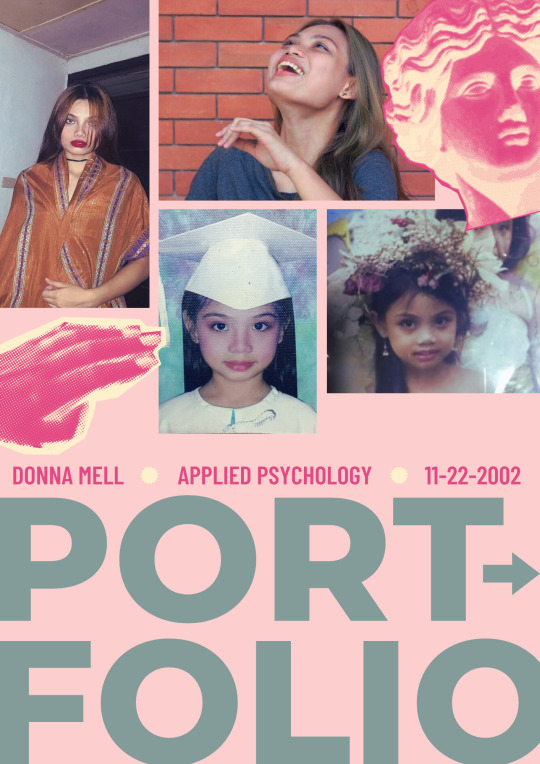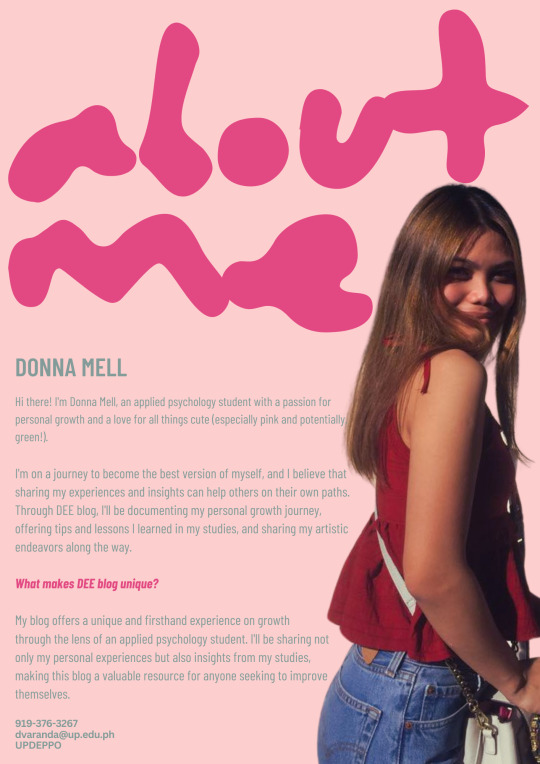Text
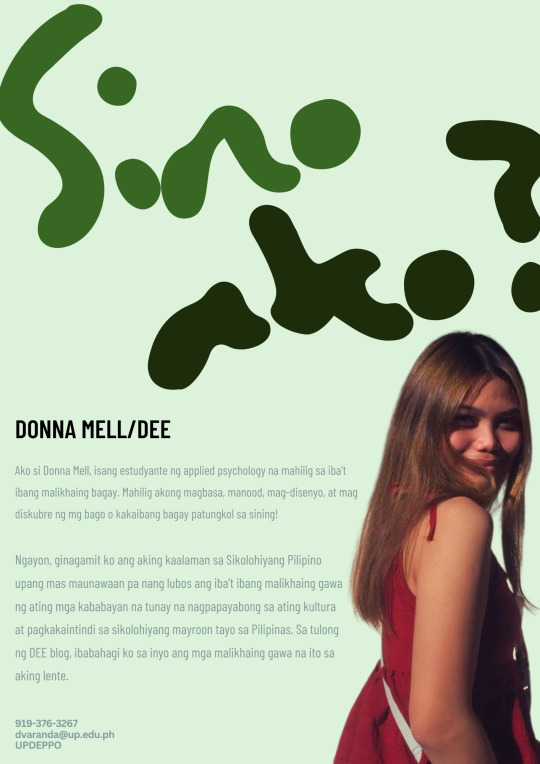
youtube
Mabuhay! Ikinagagalak kong ibahagi ang aking blogpost!
Isa itong kalipunan ng aking saloobin at repleksyon sa Sikolohiyang Pilipino.
0 notes
Text
youtube
Malikhaing Pinoy 2: "Ako Naman Muna"--The Tagasalo Personality

Si Angela Ken, isang 22-taong gulang na mang-aawit at manunulat ng kanta, ang hinahangaan ngayon ng milyon-milyong tagapakinig dahil sa natatanging husay sa pag-awit at makahulugan at relatable na awitin, lalo na sa sikat na hatirang pangmadla na TikTok. Ang kanyang tinahak patungo sa pagiging isang sikat na mangaawit ay nagsimula sa paglabas ng kanyang hindi pa buo noon na komposisyon, "Ako Naman Muna," na mabilis na nag-viral online. Lubos na naantig ng kanta ang puso ng mga pinoy, lalo ang mga panganay at gitna (middle) na anak at mga breadwinner, na humantong sa isang kontrata sa pagrerekord ng buong bersyon nito sa sikat na recording management at talent agency sa bansa, ang ABS-CBN Star Magic.
Ang "Ako Naman Muna" ay isang awitin na likha ni Angela Ken ay higit pa sa isang kanta; ito ay isang himno para sa pagmamahal sa sarili, pagtanggap, at pagiging matatag, na kung susuriin ay talagang tumatalakay sa buhay ng mga mananalong kapamilya. Inilabas noong Nobyembre bilang isang snippet sa TikTok, ang buong bersyon ng kanta ay tinanggap ng napakalaking suporta, na nakakuha ng milyon-milyong views sa iba't ibang hatirang pangmadla, tulad ng TikTok, YouTube, Spotify, at marami pang iba. Ang mga liriko at kataga na isinulat mismo ni Angela Ken, ay tumatalakay sa mga tema ng kalungkutan, pagdududa sa sarili, at ang kahalagahan ng paghahanap ng kapayapaan sa sarili at matibay na suporta ng mga mahal sa buhay o mga taong malapit sa atin.
Ngunit, paano nga ba maiuugnay ang kantang ito ni Angela Ken sa Sikolohiyang Pilipino? Sa katunayan, naniniwala ako na sa pangkalahatan, ang mga awiting gawa ng mga Pilipino ay madalas na sumasalamin sa kultura at sikolohiya ng mga Pilipino. Ang mga awiting ito ay kadalasang naglalaman ng mga personal na karanasan ng mga manunulat; mapa-rap, kontemporaryo, ballad, R&B, at iba pa. Sapagkat ang mga karanasang ito ay nahuhubog ng kultura at lipunan, natural lamang na sumasalamin sa mga kanta ang mga halaga, paniniwala, at mga isyung kinakaharap ng ating kababayan. Sa malalim na pag-unawa, maiuugnay ang awiting ito ni Angela Ken sapagkat sumasalamin ito sa teoryang tinatawag natin na tagasalo personality.
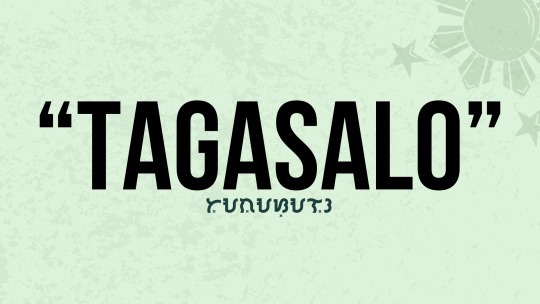
Ang konsepto ng "tagasalo" sa konteksto ng pamilyang Pilipino ay isang interesanteng paksa na pinagtuunan ng pansin ng mga mananaliksik tulad nina Carandang (1987) at Udarbe (2001). Base sa ating babasahin, natuklasan na ang personalidad ng tagasalo ay hindi sistematikong nauugnay sa kasarian o sa pagkakasunod-sunod ng kapanganakan bagkus maaaring mag-ugat sa pangangailangan ng isang bata na maging natatangi sa kanyang kapatid. Sinasabi na itong kagustuhang ito ay maaaring magdulot ng emosyonal na kaguluhan sa kanyang pamilya.
Ayon kay Carandang (1987), ang "tagasalo" ay madalas na ang gitnang (middle) anak o kaya naman ay babae sa pamilya. Ang mga indibidwal na ito ay karaniwang inaasahang mag-alaga at tumulong sa mga gawaing bahay mula sa murang edad. Ang mga karanasang ito ay nag-aambag sa pag-unlad ng kanilang personalidad bilang isang "tagasalo," na nagiging isang mahalagang bahagi ng kanilang identidad.
Samantala, binigyang-diin ni Udarbe (2001) na ang papel ng "tagasalo" ay hindi lamang resulta ng mga istruktura ng pamilya, edad o kasarian. Ayon sa kanyang pananaliksik, ang mga pangyayaring hindi inaasahan tulad ng mga aksidente o sakit ng isang miyembro ng pamilya ay maaari ring mag-udyok sa isang indibidwal na mag-ako nang mas malaking responsibilidad. Naniniwala sila na kinakailangang mayroong magkontrol sa isang pamily o samahan na magbubuo ng mga alituntunin. Ang mga karanasan at paniniwalang ito ay maaaring magdulot ng pangangailangan na magbigay ng suporta at proteksyon sa mga mahal sa buhay, na nagtutulak sa kanila na maging isang "tagasalo.
Ang tagasalo ay isang anak na responsable at mapagmalasakit, isang tagapakinig at tagapamagitan, na nagnanais ng pagkakaisa, at mayroon ding malakas na pangangailangan para sa kontrol at kakayahan para sa emosyonal na distansiya.
"Tagasalo comes from the root word salo, which literally means "to catch." With the prefix taga it means "one who catches." Used colloquially, the word refers to one who "takes care, or one who comes to the rescue." Mananalo is a synonym of tagasalo."
Maria Lourdes Carandang
Nauunawaan ko ang "tagasalo" bilang isang konsepto na madalas naiuugnay sa isang indibidwal na may kakayahang unahin ang pangangailangan ng iba kaysa sa sarili; mga tao na pinipili ang kasiyahan at kapananan ng iba higit sa kanila. Sila ay madalas na nagsisilbing suporta, tagapakinig, at tagapayo sa kanilang mga mahal sa buhay, kaibigan, o maging sa grupo na kanilang binibilangan, kung kaya tinawag sila na tagasalo. Ngunit, ang pagiging isang "tagasalo" ay hindi madali. Sa katunayan, hindi lahat ng tao ay kayang maging isang tagasalo—may mga kasamang hamon at emosyonal na paghihirap na madalas na hindi napapansin ng tao sa paligid ng mga ito. Masasalamin ang iba't ibang pakiramdam na ito sa awitin ni Angela Ken.
Ako Naman Muna
La la la
Kada hakbang sa lupa'y para akong inaalon At nalulunod sa batikos ng mundo Sa kung ano lamang ang kaya ko Pigang-piga na sa mga problemang 'di masolusyonan agad
Parang wala ng bukas Pwede bang umiwas Hinahanap ang sarili ngunit 'di na kakayanin Sa ligaw na dinadaanan ko
Sa'n na 'to patungo Sa'n na 'ko patungo Dahan-dahan nating simulan muli ang paghakbang Dahan-dahang tumingin sa salamin Upang makita ang ating kagandahan
Dahan-dahang iangat ang mukha Upang masilayan ang payapang kalangitan Oo pagod ka na pero 'di ka nag-iisa Kaya't lumaban ka at sabihing Ako naman muna
Kada langhap sa hangin pansin ko na lagi na lang usok Walang malinis halos puro polusyon Parang ako raw na konsumisyon Gulong-gulo ang isip sa'n ba lulugar kapag nagkamali Grabe sila manghusga Bakit perpekto ba sila
Huminga ka ng malalim at isipin ng mabuti Ang mga desisyong ilalaan para sa kinabukasan Nang makapunta sa paroroonan
Kung dahan-dahan nating simulan muli ang paghakbang (muli ang pag-hakbang) Dahan-dahang tumingin sa salamin Upang makita ang ating kagandahan Dahan-dahang iangat ang mukha Upang masilayan ang payapang kalangitan
Oo pagod ka na pero 'di ka nag-iisa (di ka nag-iisa) Kaya't lumaban ka at sabihing Ako naman muna Ako naman muna
Huwag papalamon sa lungkot Huwag hahayaang malugmok ang puso mo Sa ibabato sa 'yo ng iba Tandaan mong sapat ka
Dahan-dahang tanggalin ang maskara At hayaang tumulo ang bumabadyang mga luha Dahan-dahang iangat ang mukha Upang masilayan ang mga taong ika'y pinapahalagahan Oo pagod ka na pero 'di ka nag-iisa Kaya't lumaban ka at sabihing Ako naman muna Ako naman muna
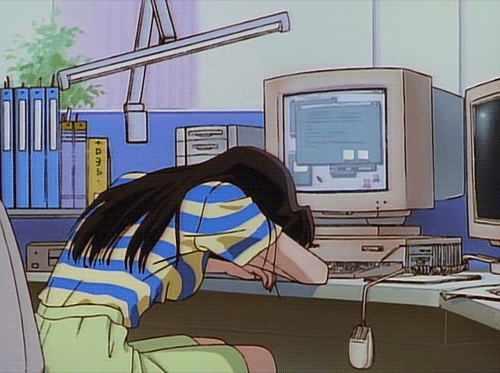
Kung susuriin, maraming tema ang makikita na nag-uuganay sa mga liriko ng kanita ni Angela Ken sa teoryang Tagasalo Personality. Ang ilan sa mga ito ay ang pagpapahiwatig ng bigat ng loob at pagsalo, pagdududa sa saili, pagpapahalaga sa sarili, at kahalagahan ng kapaligiran.
Bigat ng Loob at Pagsalo
Alam natin na ang tagasalo personality ay ang personalidad kung saan ang mga indibidwal ay umaako ng mga mabigat na responsibilidad sa pamilya o kahit anong grupo na kaniyang kinabibilangan. Ang responsibilidad na ito ay madalas na nagmumula sa iba't ibang mga kadahilanan. Mahalagang tandaan na ang pagiging "tagasalo" ay hindi lamang isang madaliang gawain. Ayon sa isang karagdagang obserbasyon, sa iba't ibang yugto ng buhay ng pamilya, maaaring magkaroon ng mga sitwasyon na nagdudulot ng stress sa mga relasyon na may kaugnayan sa loob ng pamilya. Sa mga pagkakataong ito, maaaring may isang miyembro ng pamilya na umako—manalo—upang maibsan ang tensyon at mapanatili ang kapayapaan sa loob ng pamilya.
Sa isang pamilya, halimbawa, kasama sa kadahilanan na ito ang pinansiyal, mga inaasahan ng magulang na katuwang, at pangangailangan na bumawi sa mga kakulangan ng ibang miyembro ng pamilya. Binibigyang-diin ng mga lirikong ito ni Angela Ken ang papel na ginagampanan ng isang tao sa kaniyang napaliligiran sa paghubog ng personalidad ng tagasalo. Halimbawa na lamang, ang pagkakaroon ng isang kamag-anak na nagdudulot ng kaguluhan o ang "black sheep" sa pamilya ay mayroong napakalaking impluwensya sa pagkakahubog ng tagasalo na personalidad sa isang tao. Dahil sa kagustuhan na bumawi sa hatid na epekto ng kamag-anak na ito, ang tagasalo ay maaaring tumanggap ng mas mabigat at maraming responsibilidad. Maaari rin na mag-ugat mula rito ang pagsisikap ng isang tagasalo na maging perpekto at pag-iwas sa pagiging "pabigat" sa kanilang tahanan o pamilya.
Ito ang dahilan kung bakit ang mga linya tulad ng "pigang-piga na sa mga problemang 'di masolusyonan agad" at "parang wala ng bukas" ay nagpapakita ng karaniwang karanasan ng mga indibidwal na maituturing na swak sa tagasalo personality. Dahil sa lubos na pag-aalaga sa iba at pag-asa na mapanatili ang kaayusan sa pamilya, maaari silang makaramdam ng bigat ng loob at mauwi sa kalugmukan. Ang paulit-ulit na mga linya na ito sa buong awitin ay pumapatungkol sa pagkaligaw at hindi pagkakaalam kung saan na patungo ay nagpapakita ng pagkalito at kawalan ng katiyakan na maaaring maranasan ng mga mananalo kapag ang kanilang mga pagsisikap upang tulungan ang iba o ang kanilang pamilya ay tila madalas hindi napagtutuunan ng pansin o halaga.
Pagdududa sa Sarili
Parehong binibigyang-diin ang mabigat na pasan ng responsibilidad na dinadala ng mga indibidwal na tumatanggap ng papel ng tagapag-alaga o tagapayapa—mananalo. Ang patuloy na presyon upang matugunan ang mga inaasahan, kadalasan sa kapinsalaan ng sariling mga pangangailangan, ay maaaring humantong sa mga damdamin ng kawalan ng kakayahan at pagdududa sa sarili.
Parehong nagpapahiwatig ang mga liriko at ang konsepto ng "tagasalo" ng malakas na pag-asa sa panlabas na pagsang-ayon. Ang "tagasalo" ay madalas na naghahanap ng pagsang-ayon mula sa iba, lalo na sa mga miyembro ng pamilya, at maaaring makaramdam ng kawalan ng kakayahan kapag sa tingin nila ay hindi nila natutugunan ang mga inaasahan. Ang mga liriko ay sumasalamin sa damdaming ito sa pamamagitan ng mga linya na nagpapahayag ng takot sa paghuhusga ("Grabe sila manghusga").
Samakatuwid, ang mga linya o lirikong ito sa kanta at ang konsepto ng "tagasalo" ay nag-aalok ng isang magkasanib na salaysay ng mga hamon at komplikasyon ng pagdadala ng mabigat na emosyonal na hamon. Parehong tinatalakay ang mga tema ng responsibilidad, pagdududa sa sarili, at ang pagnanais para sa pagsang-ayon. Sa pamamagitan ng pag-unawa sa mga koneksyon sa pagitan ng dalawa, maaaring maunawaan ng mga indibidwal ang kanilang sariling mga karanasan at mahanap ang mga paraan upang linangin ang mas mga konsepto ng pagmamahal sa sarili at pagiging matatag.
Pagmamahal sa Sarili
Ang pagiging isang tagasalo ay hindi isang madaling gawain. Ito ay nangangailangan ng malaking pagtitiis, empatiya, at kakayahang unawain ang iba't ibang perspektiba. Ang paghahangad ng pagkakaisa at pagkakaunawaan sa tahanan ay isang pangunahing motibasyon para sa kanila, kung saan ang mga magulang ay itinuturing na sentro ng pamilya. Ang pag-aaral ukol dito ay nagsasabing madalas na nagsasangkot ng pagiging mananalo ang kakayahang magmahal at magmalasakit nang malalim, ngunit sa kabilang banda, nangangailangan din ng kakayahang magtaguyod ng emosyonal na distansiya, lalo na sa pakikipag-ugnayan sa mga ispesipikong kapamilya tulad ng kapatid. Bagama't mahalaga ang papel na ito sa pagpapanatili ng kapayapaan at pagkakaisa sa pamilya, mahalaga rin na tandaan ng mga mananalo na alagaan din ang kanilang sariling emosyonal at mental na kalusugan.
Ang isang mananalo ay madalas na nakatuon sa pangangailangan ng iba, na nagpapabayaan sa kanilang sariling kapakanan. Ang mga linya tulad ng "Dahan-dahan tumingin sa salamin Upang makita ang ating kagandahan" at "Ako naman muna" sa awitin ni Angela Ken ay nagsisilbing paalala na ang mga indibidwal na ito ay may karapatan ding unahin ang kanilang sariling kaligayahan at pangangailangan. Kapag naisagawa ito, naiiwasan ang pagkalugmok at stress na nadarama ng tagasalo mula sa patuloy na pagbibigay ng sarili. Ang pag-aalaga o pagmamahal sa sarili ay isang mahalagang hakbang upang maiwasan ito at mapanatili ang maayos na emosyonal na katayuan ng isang mananalo.
Kung susuriin, maiuugnay ang tagasalo personality sa pagiging people pleaser ng isang tao. Dahil sa kanilang likas na pagnanais na magpasaya sa iba at kagustuhan na hindi ma-disappoint ang mga ito, maaaring mahihirapan silang tumanggi sa mga kahilingan o pabor na hinihingi. Ang patuloy na pagpayag sa mga bagay na hindi nila kayang gawin ay maaaring magdulot ng kaguluhan sa mental at emosyonal nilang estado na nagdudulot ngpagkapagod, pagkalungkot, at iba pang mas malalim na pakiramdam na lubusang bumabagabag sa isip at kanilang gawa.
Ang pagtatakda ng mga hangganan ay isang mahalagang hakbang sa pagmamahal sa sarili upang maiwasan ang negatibong epekto ng pagiging isang people pleaser sa mga mananalo. Kapag may malinaw na mga hangganan, mas magiging malinaw sa iba ang kanilang mga pangangailangan at limitasyon. Ito ay maaaring magpabuti sa mga relasyon dahil maiiwasan ang mga hindi pagkakaunawaan. Sa pamamagitan ng pagsasabi ng "hindi" sa mga angkop na sitwasyon, natututunan ng mga mayroong tagsalo personality na pahalagahan ang kanilang sariling oras, enerhiya, at emosyonal na kalusugan.
Dagdag pa rito, mapapansin na hinihikayat ng huling saknong ang mga tagapakinig na tanggalin ang maskara at yakapin ang kanilang mga emosyon. Ito ay isang mahalagang hakbang sa proseso ng pagmamahal sa sarili na ma maaaring madalas pigilan ang kanilang sariling damdamin upang unahin ang mga saloobin ng iba.
Kahalagahan ng Kapaligiran
Lahat ng tao sa paligid ay may epekto sa atin. Ang papel ng mananalo ay mahalaga sa pagpapanatili ng kapayapaan at pagkakaisa sa tahanan. Ngunit, tulad ng lahat ng tao, ang mga "tagasalo" ay nangangailangan din ng suporta at pag-unawa.
Sa kabila ng kanilang mga kakayahan, ang mga tagasalo ay mga tao lamang. Ang linya na "Oo pagod ka na pero 'di ka nag-iisa" ay isang paalala na kahit na sila ay nakakaranas ng mga hamon, hindi sila nag-iisa sa kanilang paglalakbay. Ang linya na ito ay isang paalala na ang kanilang mga karanasan ay normal at na may iba pang mga tao na nakakaunawa sa kanilang pinagdadaanan.
Ang pagkakaroon ng isang matibay na sistema ng suporta ay maaaring makatulong sa kanila na mabawasan ang lugmok at pasakit na nararamdaman na dulot ng patuloy na pagbibigay sa iba. Higit pa rito, ang pagkilala at pagpapahalaga sa kanilang mga kontribusyon ay maaaring magpalakas ng kanilang pagpapahalaga sa sarili. Ang pakiramdam na naiintindihan at tinatanggap sila ng pamilya o grupong kinabibilangan ay maaaring magbigay sa kanila ng lakas ng loob na harapin ang kanilang responsibilidad bilang mananalo. Kapag nakaramdam sila na sila ay nakikita at pinahahalagahan, masmagiging bukas sila na humingi ng tulong kung kinakailangan. Sa pamamagitan nga ng pakikipag-ugnayan sa iba, maaari rin silang matuto ng mga bagong kasanayan at estratehiya sa pagkaya na makakatulong sa kanilang personal na pag-unlad.
Sa pangkalahatan, ang pagkakaroon ng isang matibay na sistema ng suporta ay maaaring magbigay sa kanila ng lakas ng loob na harapin ang mga hamon ng buhay at magpatuloy sa pagiging isang positibong impluwensya sa kanilang mga pamilya.
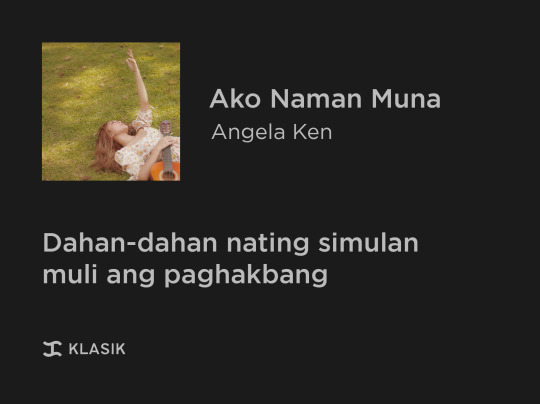
Ang awiting "Ako Naman Muna" ni Angela Ken ay higit pa sa isang kanta; ito ay isang salamin ng mga karanasan at emosyon ng isang tagasalo. Sa pamamagitan ng mga makahulugang liriko, napukaw ng awitin ang puso ng maraming Pilipino, lalo na ng mga indibidwal na madalas na naglalagay ng pangangailangan ng iba bago ang kanilang sarili.
Ang konsepto ng ng teoryang tagasalo personality ay malalim na nakaugat sa kultura ng Pilipinas. Ang awit ni Angela Ken ay nagbibigay ng boses sa mga karanasa ng mga ito. Ang mga liriko ay nagpapahayag ng mga damdamin ng pagkapagod, pagkalito, at pagnanais para sa pagkilala. Sa pamamagitan ng pagbabahagi ng kanyang mga personal na karanasan, pinapaalala ni Angela Ken sa mga tagapakinig na hindi sila nag-iisa sa kanilang mga pakikibaka.
Tunay nga na nag "Ako Naman Muna" ay hindi lamang isang awitin, ito ay isang paalala na kahit na mga "tagasalo," mahalagang unahin din ang mga sariling pangangailangan. Ang pagmamahal sa sarili ay hindi isang tanda ng kahinaan, kundi isang tanda ng lakas. Sa pamamagitan ng pag-aalaga sa sarili, mas magiging epektibo at matatag ang isang mananalo sa pag-salo sa iba.
Sa pangkalahatan, ang awiting ito ay nag-aalok ng isang mensahe ng pag-asa at inspirasyon. Ito ay isang paalala na kahit nakakaranas ng mga pagsubok, mayroong laging pag-asa at taong susuporta para sa isang mas maliwanag na kinabukasan.
0 notes
Text
Malikhaing Pinoy 1: 'Pag Akda, ang Galing ng Pinoy Gumawa
youtube
Paano nga ba lubos na maipamamalas ang likas na pagkamalikhain ng isang Pilipino kung hindi sa pamamagitan ng isang malikhaing pamamaraan? Sa pagnanais na bigyang-diin ang malaking impluwensya ng ating mga alamat, epiko, kwentong bayan, at iba pang katutubong akda sa ating sikolohiya, nais kong ibahagi sa inyo ang isang tula na naglalaman ng aking mga saloobin.
Sa bawat tinta, buhay ang kultura, Sa bawat kwento, pagkatao'y yumayabong. Sikolohiya'y humahabi, Akda nama'y bumubuo. Sa bawat epiko, bayani'y nabubuhay, Nagbibigay inspirasyon sa bawat henerasyon. Sa bawat alamat, diwa'y nananahan, Nagpapaalala sa ating pinagmulan. Sa bawat kuwento, tayo'y nagkakaisa. Bayaniha'y tila nga nanatili na. Bata o matanda, Ating kuwento'y ating kayamanan. Puso ng bayan, tumatatag, Buhat ng sining na latag. Kaugalian noon at ngayon Sumasalamin sa lenteng naisulat at hinabi na ng panahon Oh, kay gandang tangkilikin, Pagkakakilanlan natin.
0 notes
Text
SikoPil Thoughts 1: Baboy Kayo Riyan (Thoughts on The Pig’s Meaningful Role in Pinoy Culture)
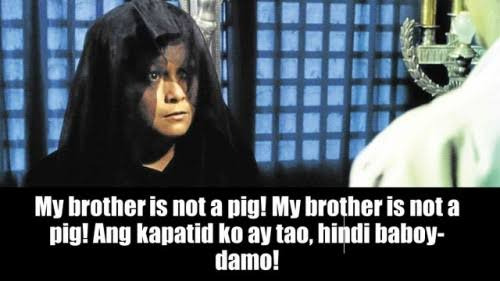
Tell me you're a Filipino without telling me you're a Filipino:
Your pambansang ulam:

Hindi ka matatawag na isang Pinoy kapag hindi ka pamilayr sa sikat na sikat na lutuing adobo. Isa itong pinagyamang identidad ng ating bayan.
Bakit? Sapagkat marahil nagmula nga ito sa bansang Spain, ang ating mga ninuno'y tinimplahan ito ng kakaibang panlasa—panlasang pinoy. Ang pinakapagkakaiba nga ng ating adobo sa kanila ay ang kasangkapan na ginagamit. Sa Pilipinas kasi, mas nakasentro sa kasangkapang toyo, suka, bawang, laurel, at higit sa lahat, may bersyon tayo ng adobo na gumagamit ng manok o baboy.
Isa lamang ang ulam na adobo sa mga pagkakakilanlan na nagpapakita kung paano ang mga Pilipino ay mahusay sa pag-aangkop sa mga impluwensyang kultura ng bansang mananakop. Dahil dito, nakalikha ang ating mga ninuno ng isang natatanging lutuin na sumasalamin sa ating identidad. Kung kaya, ang adobo ay higit pa sa isang ulam; ito ay isang simbolo ng pagiging Pilipino natin. Parte ng pagiging Pilipino na ito ang klarong bahagi ng baboy sa ating makulay at malinamnam na kultura.
Sa madaling sabi, ang adobo ay isang halimbawa kung paano ang baboy, sangkap na marahil palagian nating ginagamit sa pang-araw-araw, ay naging isang mahalagang bahagi ng ating kultura at pagkapilipino. Nagpapakita ito kung gaano kamalikhain ang mga Pilipino, na kayang makagawa ng isang bagay na bago at natatangi mula sa isang impluwensyang dayuhan, at kung paano ang pagkain ay maaaring maging isang malakas na koneksyon sa ating nakaraan at sa ating mga sarili bilang mga Pilipino.

Nang nabasa ko ang artikulong ito, talagang naengganyo ako. Bukod sa pamagat, talagang nakakahatak ang paksa nito. Hindi ko akalain na ang mga baboy ay mayroong napakahalagang papel sa kultura nating mga Pilipino.
Napakaganda ng paglalahad ng mga mananaliksik kung paano nagkakaugnay ang mga tao at mga baboy sa Pilipinas sa loob ng mahabang panahon. Mula sa mga sinaunang panahon hanggang sa kasalukuyan, malaki na ang papel na ginagampanan ng mga baboy sa ating buhay, hindi lamang bilang pagkain, kundi bilang bahagi na rin ng ating mga tradisyon at paniniwala.
Dahil dito, napagtanto ko na tunay na mahalaga ang pag-aaral tungkol sa mga ritwal at paniniwala na may kinalaman sa mga baboy dahil nagbibigay ito ng malalim na pag-unawa sa ating kultura at kasaysayan. Dati, maituturing ko itong isang nakakatakot na pangayayari dulot na rin ng mga napapanood na nakakatakot na pelikulang nag-uugnay sa ritwal na ginagawa sa mga baboy. Hinding-hindi ko malilimutan ang isang pelikula mula sa bansang Japan na aking napanood noong ako'y nasa ika-pitong baitang. Mayroong eksenang pinakasal ang bidang baabe sa isang tao na may ulo ng baboy, at sinasamba ito ng mga bisita. Para sa akin, isang "weird" na kaganapan ito.
Ngunit, habang nadadagdagan ang aking pag-unawa sa iba't ibang paniniwala at kultura na mayroon ang iba't ibang bansa, mas nagiging bukas na ako sa usaping ito at mas lumalalim ang aking kuryosidad patungkol sa mga ito.
Sa aking palagay, dapat nating pahalagahan at ipagmalaki ang mga katutubong lahi ng baboy dahil sa pamamagitan ng pag-aaral at pagpapalaganap ng kaalaman tungkol sa kahalagahan ng mga ito sa ating kultura, mas mapapahalagahan natin ang ating mga tradisyon at masusuportahan natin ang paglago at paglalim ng pagkakaunawa sa sarili natin.
0 notes
Text
Ngunit, para saan ang lahat ng ito?
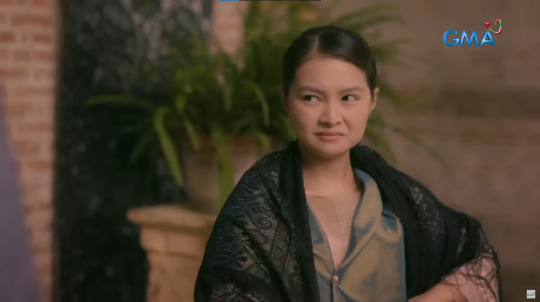
Ang mga nakalatag na malikhaing interpretasyon ay isa lamang sa napakaraming pamamaraan upang talakayin at bigyan pugay at halaga ang mga likhang Pilipino at tuklasin ang kanilang koneksyon sa Sikolohiyang Pilipino.
Nasa ibaba ang kumpletong panuto para sa asignaturang ito.
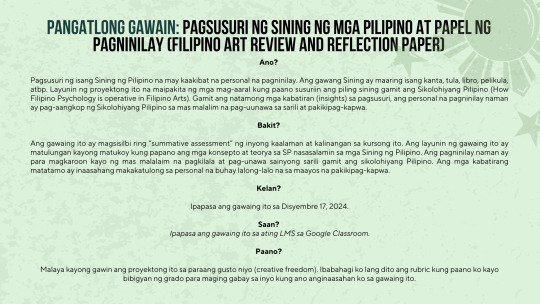
0 notes
Text
Narating mo na ang hangganan ng aking malikhaing presentasyon!
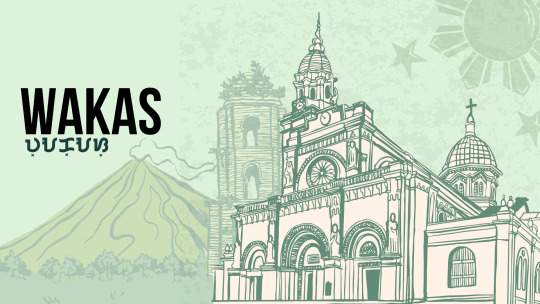
Salamat sa pagsubaybay!
0 notes
Text
MY HOLISTIC WELLNESS ACTIVITY
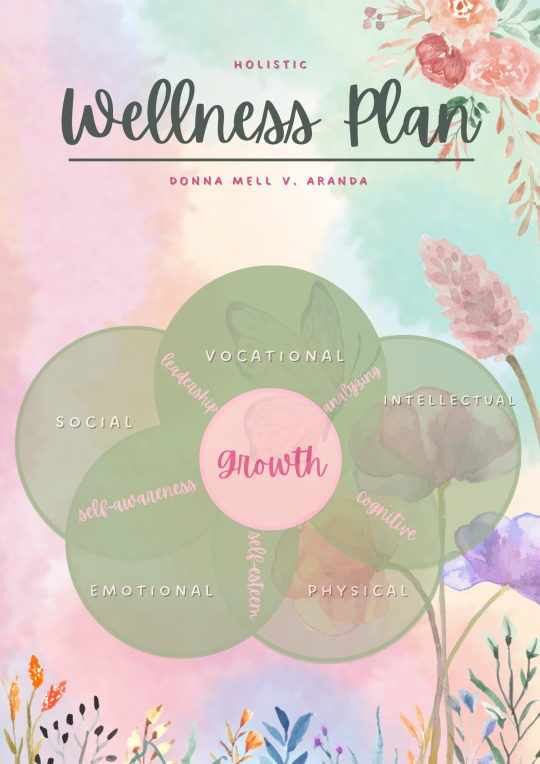
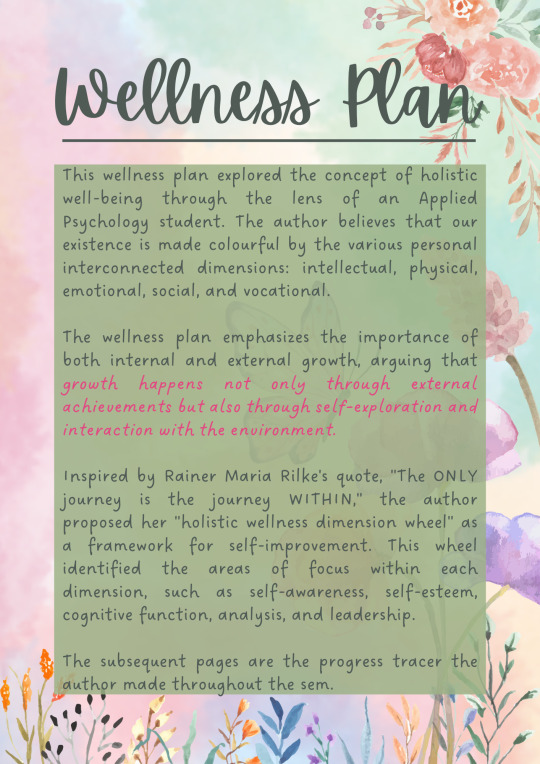
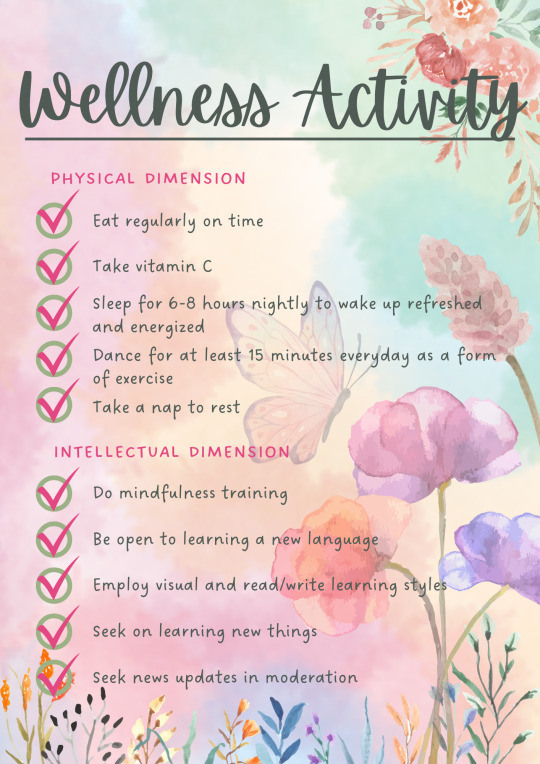
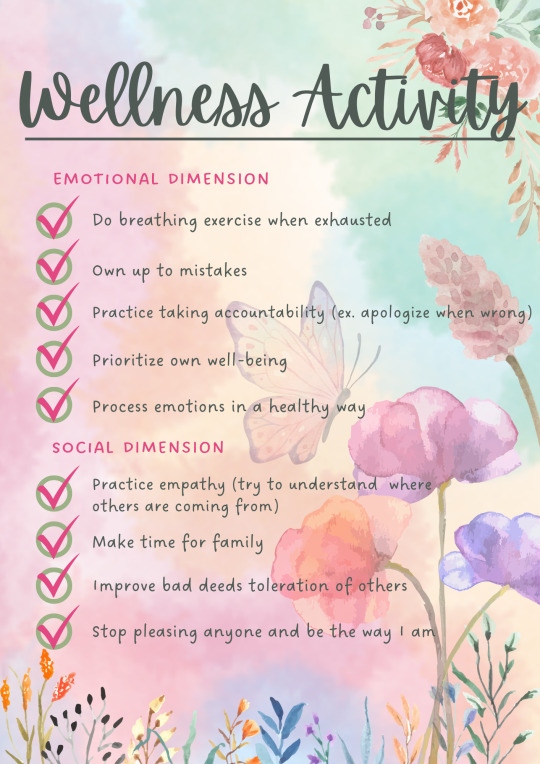
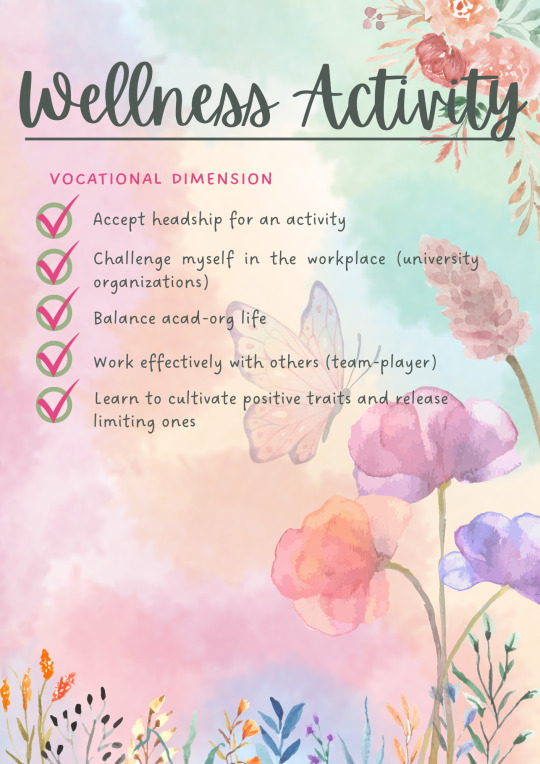
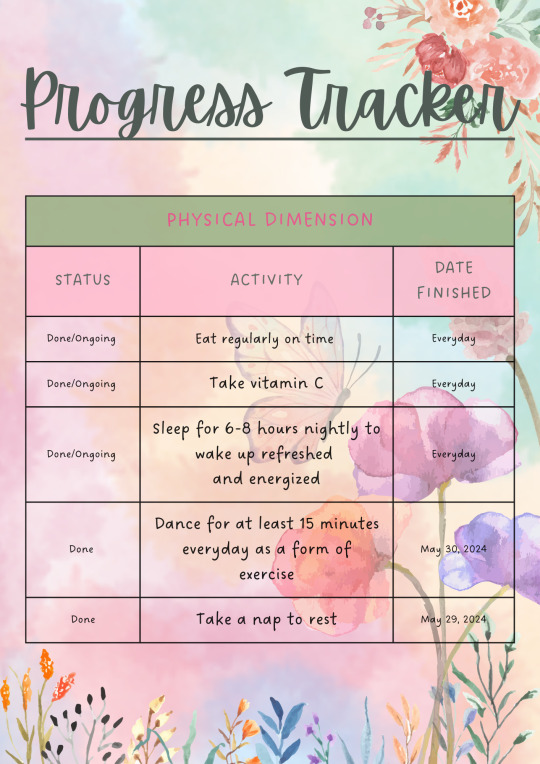
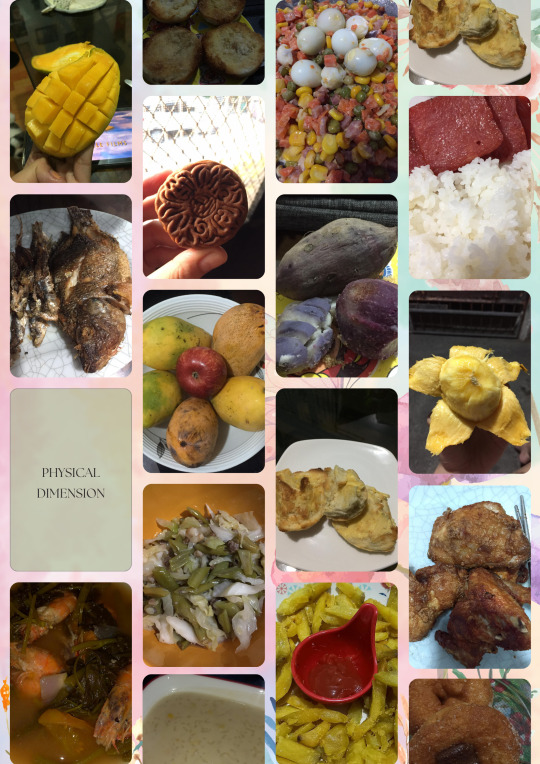

This semester, one which I truly aimed to focus on was improving my physical well-being through healthy habits. I set a goal to eat regularly and I managed to stick to it, most of the time, throughout the semester. I also aimed to take vitamin C daily, like Poten Cee, and I achieved that too. In terms of sleep, I aimed to get 6-8 hours nightly to wake up feeling refreshed and energized. I did well enough most of the time, as this semester, my goal was to choose myself, thus, I labelled it as a done and an ongoing habit. As for the nap, I strive to be more in control of it, as most of the time, my nap, even with the timer set on, continues to be a full-blown sleep.
For exercise, I set a goal to dance for at least 15 minutes every day, which I pretty much exceeded. Sometimes, I danced for hours! I managed to make this a habit, and recorded it as “done/ongoing” on the tracker, as well, as I am still planning to do this.
I am pleased with my overall success this semester in creating good habits to enhance my physical health. It appears that my main focus was on developing routines related to eating, taking vitamins, getting enough sleep, and exercising with dancing, which were lacking these past few semesters. My favorite parts? Cooking and documenting, probably!
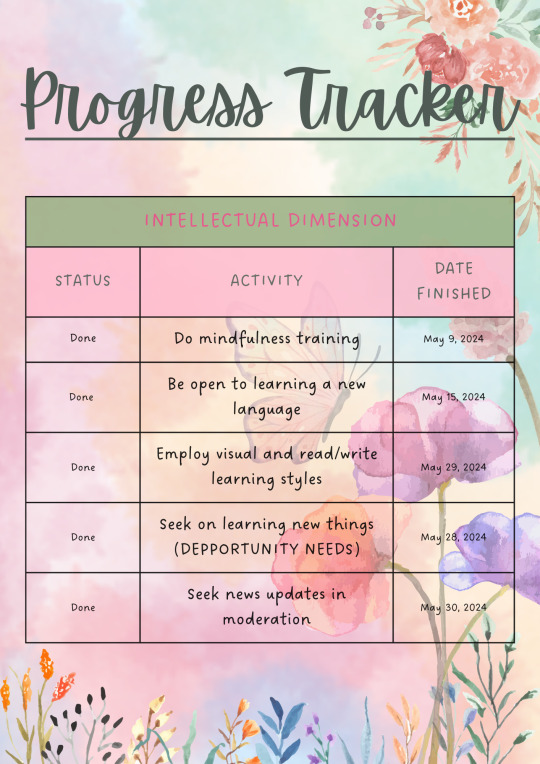

I also made a real effort to focus on my intellectual growth. I wanted to challenge myself to learn new things, even with the very tight schedule we have in my whole academic endeavor. I set a goal to try mindfulness training, a DBT Training, actually, which was led by the esteemed APsy professors, and I was happy that I was able to complete that on May 9th, 2024. The training was every Monday, although sometimes it varied, due to some unforeseen circumstances. All in all, it was eight fruitful sessions.
I also wanted to be more open to learning a new language, which first started during our PSYCH 140 and continued until my PSYCH 147, and I continued thanks to this course requirement. As you can see in the gif, I was learning Practical Chinese owing to my huge interest in Chinese Drama! Another goal I had was to find ways to incorporate both visual and reading/writing learning styles into my studies. I found a way to do that by taking notes/lectures and designing them with my highlighters and pens. I occasionally write poems, too.
Finally, I challenged myself to actively seek out new learning opportunities, especially career-wise opportunities needed for our advocacy project, the DEPPortunity. I made a note to keep an eye out for interesting workshops or courses online. I also set a goal to stay informed about current events, but to make sure I wasn't spending too much time on it because I get too occupied and stressed by them, especially when it was about crimes. I would like to say that I figured out a way to stay updated in moderation.
Overall, I'm truly pleased with how much I was able to accomplish this semester in terms of intellectual growth. I truly made a real effort to step outside my comfort zone and learn new things, things I love and passionate about.
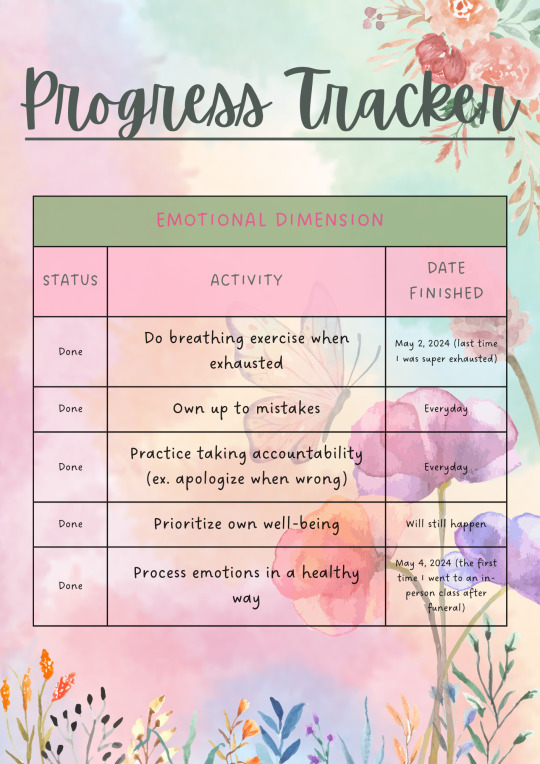
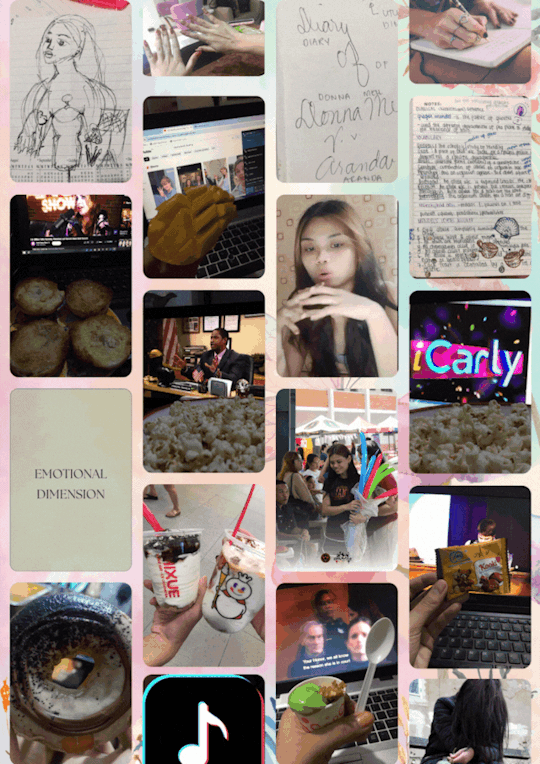
Of course, the highlight of this wellness wheel for me was the focus on developing healthy coping mechanisms for dealing with stress and difficult emotions, considering the emotional war shock I felt this year. As mentioned in my fourth e-journal, I set a goal to use breathing exercises when I felt overwhelmed, and most of the time, I do the 1-10 technique. At first, it was hard to employ what I learned in the DBT, like being mindful and doing breathing exercises, but as one of the professors said, practice improves us.
Another goal I had was to take responsibility for my mistakes, which actually related to my emotion control. If I know it is my fault, I will not argue; I will acknowledge the mistake and own up to it. I wanted to be more upfront about apologizing when I was wrong. My progress tracker shows how I consider this as an ongoing effort because it is, in fact, a continuous process, and I have been working on this every day, or at least every chance I get.
Prioritizing my well-being was another big goal for this semester because as I have said, I prioritize myself, my mental well-being, and my emotional state this semester. The tracker shows that this is still a work in progress, much like other continuous growth, but I am committed to making it a habit.
Finally, I wanted to find healthier ways to process my emotions. There were times that I diverted my heightened emotions into creativity and leisure activities. I wrote poems, drew, painted, watch series or movies, surf the net, scroll through TikTok, and even danced, and they really, really helped. At least, it made me forget my feelings for a while.
When it comes to emotional growth, I would say that I cultivate some coping mechanisms and make an effort to be more accountable for my actions. I will pretty much continue to focus on prioritizing my well-being and finding healthy ways to deal with difficult emotions, especially with my situation now.
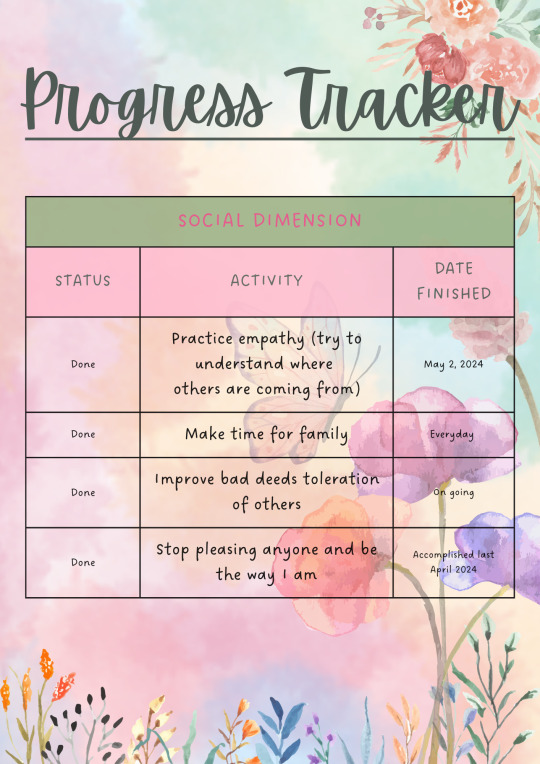
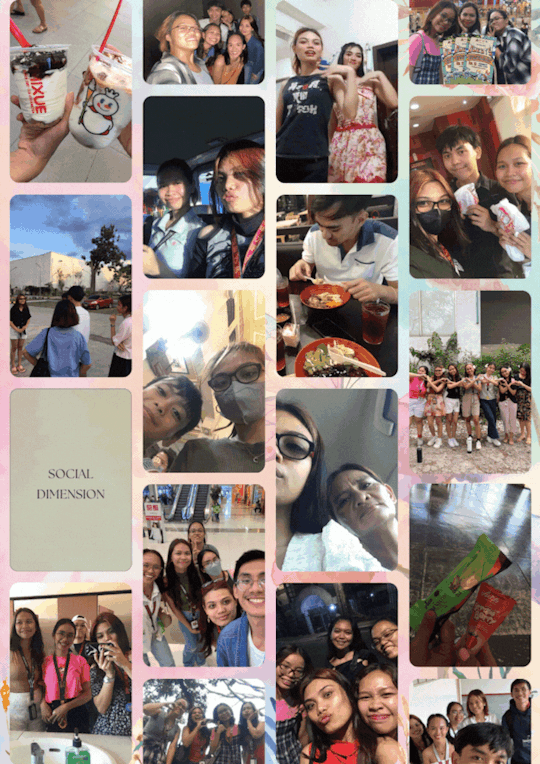

Strengthening my social connections and becoming more comfortable interacting with others in the social dimension was the thriving dimension during the first part of the semester. My friends and I got to bond every face-to-face. Hence, I set a goal to be more empathetic towards others and tried to understand where they are coming from.
Another goal I had was to spend more quality time with my family. When I was at home, I would bond with my family, it was not something I could just put a finished date on, I have been working on this every day. I made a conscious effort to put away my phone and be fully present during meals and family matters. Sometimes, my sister and I or my mother and I would go out the house and have our sponty gala.
One of the best parts of my cultivation of my social dimension is my bonding with my nephews, definitely worth the time!
I also wanted to improve my tolerance of others' shortcomings. I feel like, if I want to improve myself internally (emotional dimension), I should also improve the way I interact with people. The tracker shows that I worked on this throughout the semester and considered it accomplished in April. This involved learning to accept that people make mistakes and that everyone has flaws, which is okay. I need to be kind and compassionate. I focused on forgiveness and understanding, rather than getting frustrated or upset about something I do not have any control of. For I can not control what is happening to me, but I can control how I approach that challenge.
One of the most important aspects of my growth socially is not having a large number of friends, but having quality ones. So, during the semester, I aimed to stop people-pleasing and focus on being myself. This was a somewhat challenge for me, but I started by identifying situations where I found myself people-pleasing. Once I was aware of these situations, I could start to assert myself more and say no when I needed to. I also focused on surrounding myself with people who appreciated me for who I am. I will continue to focus on building strong social connections and being comfortable being myself around others.
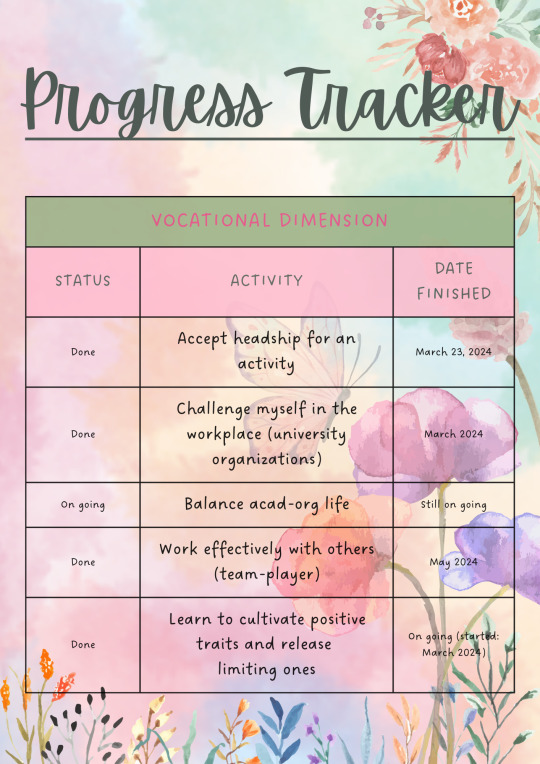

As a student with a current headship position in an organization, tracking my progress in this area through the wellness wheel was a valuable experience. This semester seemed to fly by overall, but some months definitely felt slower! Looking back at my vocational goals, I'm proud to say I fulfilled my responsibilities. Leading the member relations activity with our alumni was a highlight of the semester. I spearheaded the organization's first Acquaintance Party since the pandemic, which was a great success.
Not only did I focus on one organization, but with my other affiliation, too. In fact, I volunteered on many committees for the program organization during the week of celebration. Most of my role was about programs, which cultivated my skills in flow preparation, and more of behind the scene tasks of the event.
Nevertheless, I do acknowledge that my mindset continues to be my greatest challenge or nemesis of mine. I started working on developing a more positive attitude and letting go of those limiting beliefs back, which I will keep working on. All in all, I think this semester I really made some progress toward being more involved and developing professionally, which prepares me for my possible related career in the future.
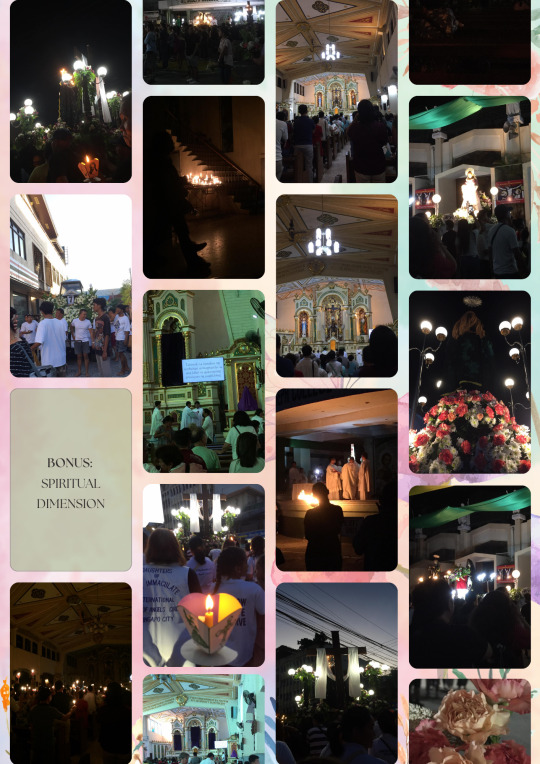
youtube
2 notes
·
View notes
Text
Flight to Becoming a Flight Attendant
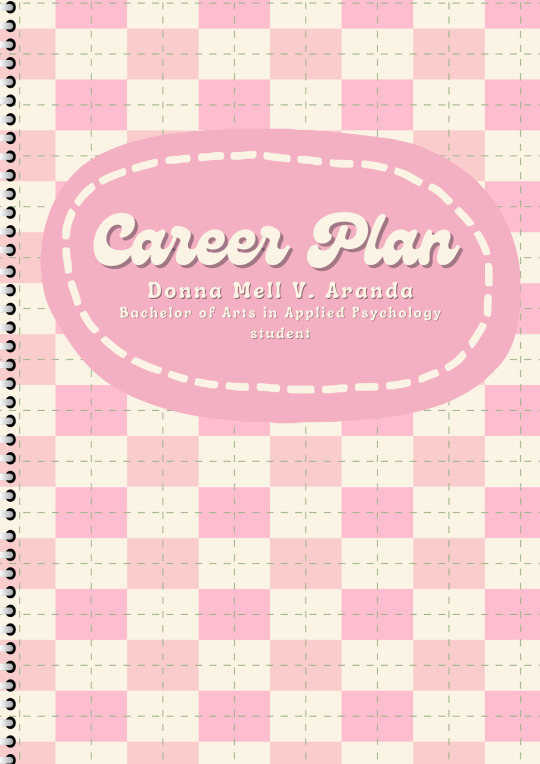
You might be wondering what career path an Applied Psychology student like me has in the aviation industry. Well, if you are curious, just keep on reading!
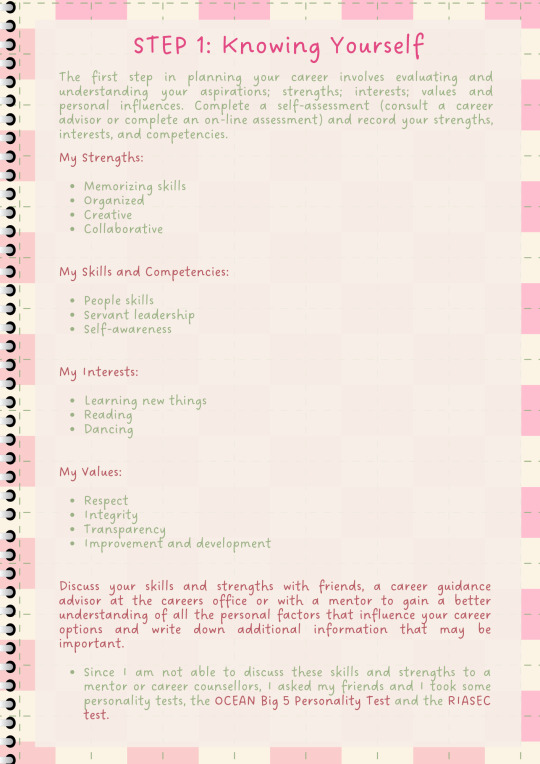
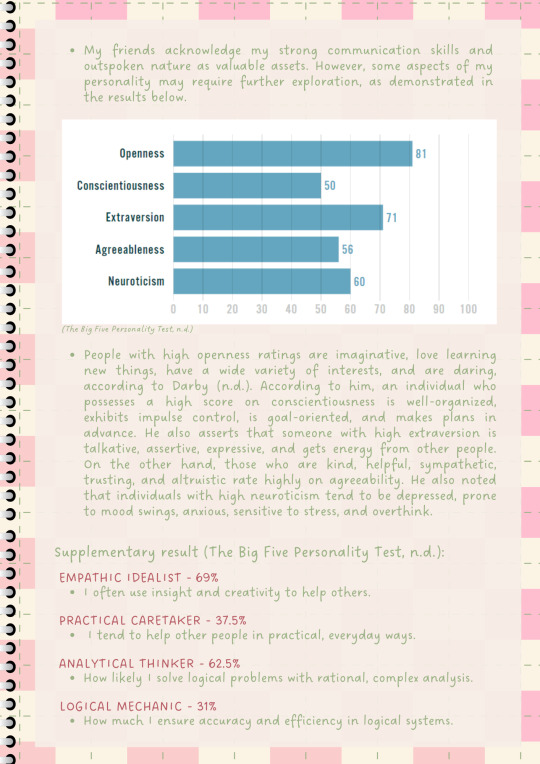
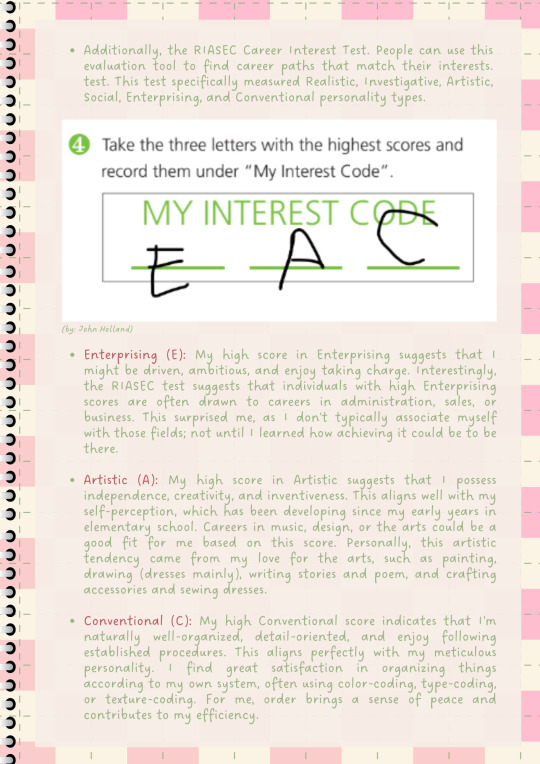
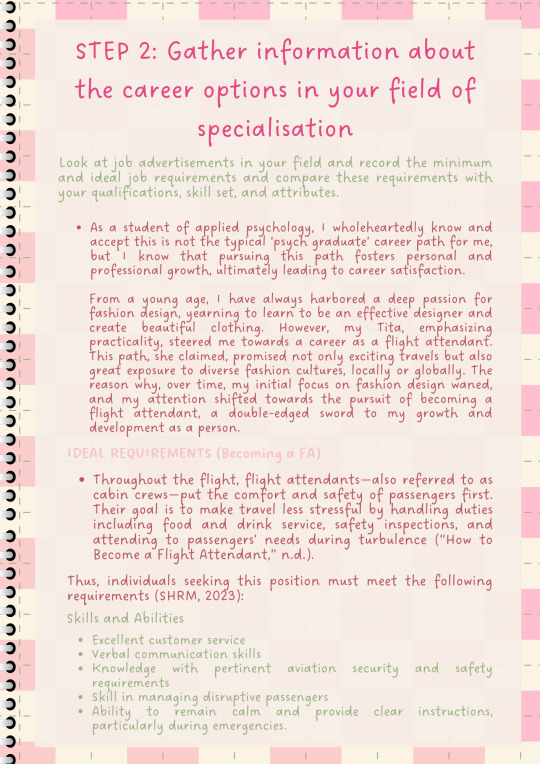
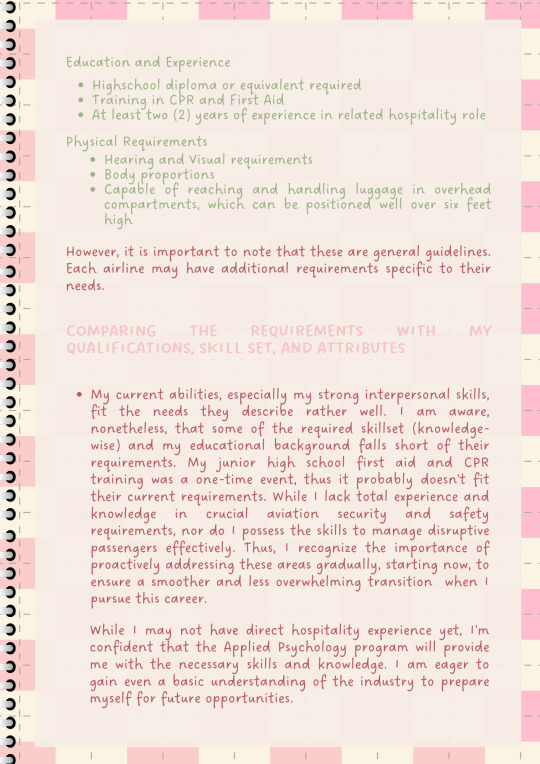
As we discussed earlier in our lessons (Career Plan Development), gathering information (Step 2) was a fascinating roller-coaster process for me. After researching each airline, I found myself coming back to the very first step, naturally comparing my skills and knowledge to the company's mission, vision, and desired employee characteristics. This, as we learned, aligns with the Trait and Factor Theory (Parsons, 1909), which proposes that a fulfilling career is achieved by matching personal traits like skills, values, and personality with job factors like pay and work environment.
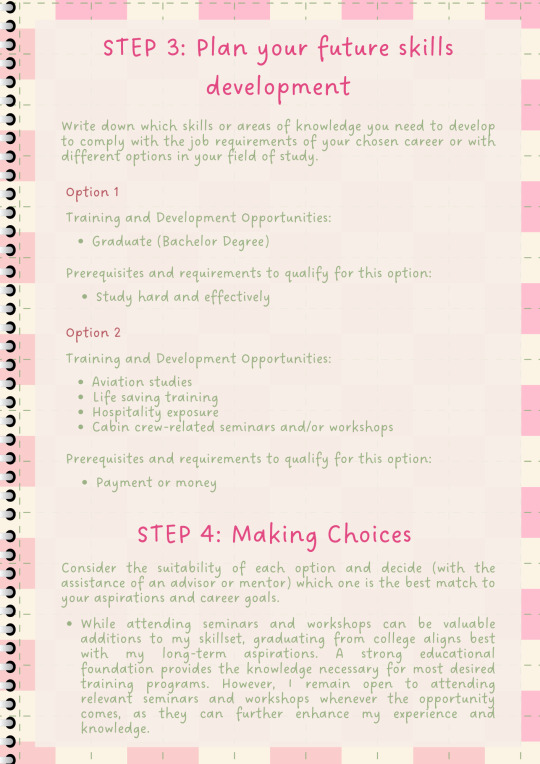
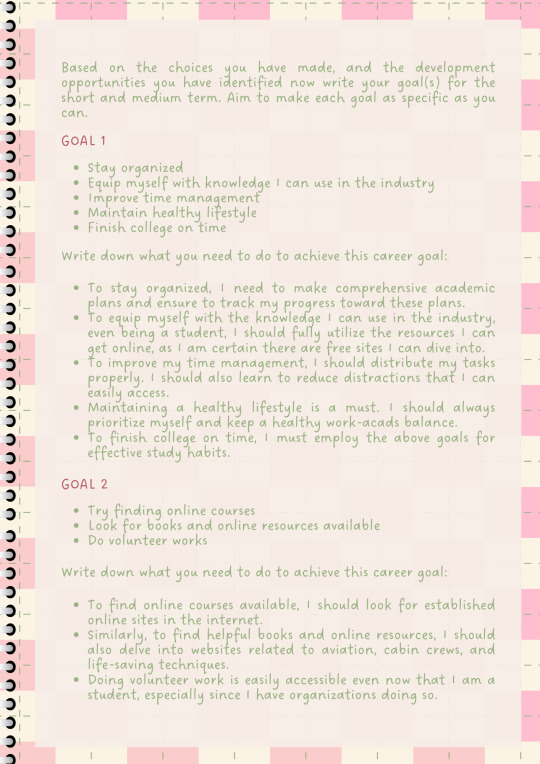
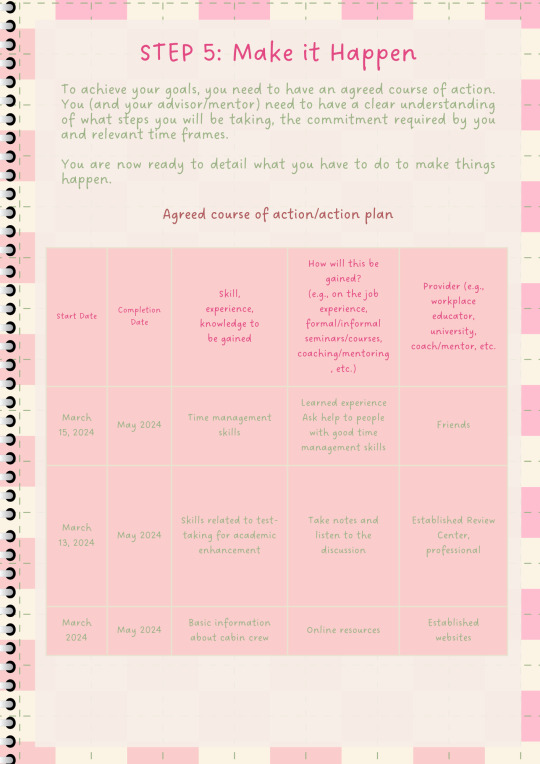
updated action plan
Since childhood, I have dreamt of becoming a fashion designer, but one day, when I told my aunt this, she then asked, "Why don't you pursue being a flight stewardess?" I was like, "How is that even related?" She explained that when I travel the world, I might have the luxury of seeing their different fashion trends, giving me a wider perspective on my fashion endeavors. So, from that on, my dream of fashion designing, became traveling the world (mainly for their fashion trends and fads), but I knew that would not be feasible for most adults with traditional office jobs. Discovering that cabin crews get to travel for a living sparked a fire within me. During senior high school, I was ready to pursue my dream, but fate intervened. While I was initially disappointed not to get into the ABM program, being in HUMSS has ultimately proven beneficial because the course brought me here to UP. While some believe that the ABM strand is the ideal path for aspiring cabin crew members, I have since learned that your chosen course or degree does not necessarily determine your eligibility for the role. Lev Vygotsky must be proud of how I was able to be influenced by the environment I was in. An organized action plan has become my point of reference as I start on the flight to become a member of the cabin crew business. This plan details the essential actions and competencies I must obtain to accomplish my objective - to know more about my desired career and prepare me to successfully achieve that career. This action plan made sure that I and my advisor/mentor were in agreement about the procedures to be followed and the amount of time that needed to be invested. Being driven by pressure and deadlines, I find that setting deadlines and defining objectives helps me keep on track and assess my progress.
The sections (represented in column) go into more detail about particular areas of development I need to undergo. It outlines the fundamental abilities, background, and information I must acquire. For instance, the present plan concentrated on developing time management abilities, which are an essential skill for each member of the cabin crew as many activities are carried out and a variety of work schedules overlap, such as the time planes take off and the time of getting to the destination.
The entire process is divided into more specifics, such as the start and end dates, the learning strategies, and the resources. In this way, it guarantees a targeted and concentrated approach to skill building. When it comes to time management, my plan specified a schedule for getting advice from friends (who excel in managing their time) and looking for other resources available online.
In general, the action plan is a still ongoing document that adapts as I progress. It offers a structure for ongoing education and personal development, ultimately clearing the path for a successful career as a member of the cabin crew.
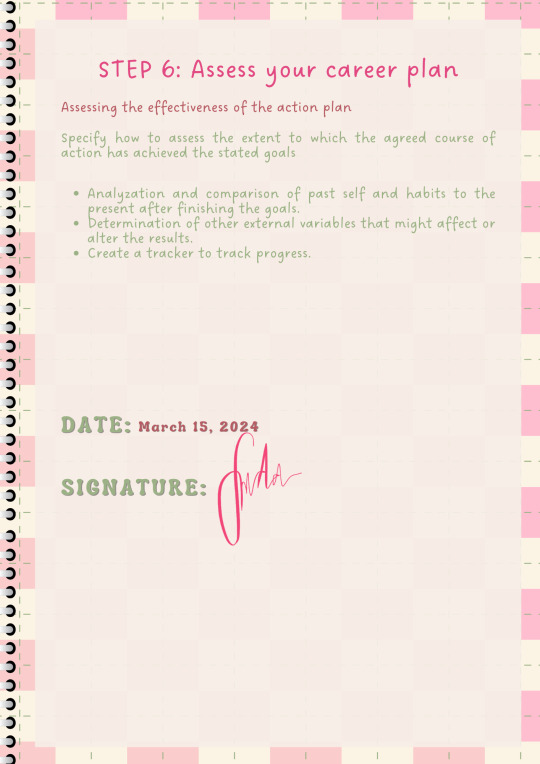
Prior to starting this career planning, I was uncertain and quite lost and disoriented. I knew exactly what kind of career path I wanted to walk through, but I had trouble figuring out where to begin and how to get there. I can now see a much clearer image of a successful journey because of the plan. The idea that planning should only be done later has been disproved by the career planning process' contribution to the early collection of necessary information about my career. The process of career planning taught me that there is no such thing as too early planning. It has deeply ingrained in me the realization that every decision I make today will have an impact on my future. While I understand that challenges will inevitably arise, I am prepared to learn and adapt from them. Nonetheless, I am aware that several external variables could impact my goal achievement. These include shifts in our economy that could impact the number of available cabin crew hiring or the overall demand for air travel. Furthermore, the airline industry is constantly evolving, particularly in light of the ongoing pandemic's new normal. New regulations, technological developments, and changing consumer demands may all affect the requirements and expectations placed on cabin crew employees. Of course, the number of eligible candidates for cabin crew positions varies depending on the airline and the state of the economy, which may affect my prospects of being hired. I am particularly from an Applied Psychology course, and while I am aware that the course covers an extensive range, having a degree in the aviation sector is unquestionably advantageous.
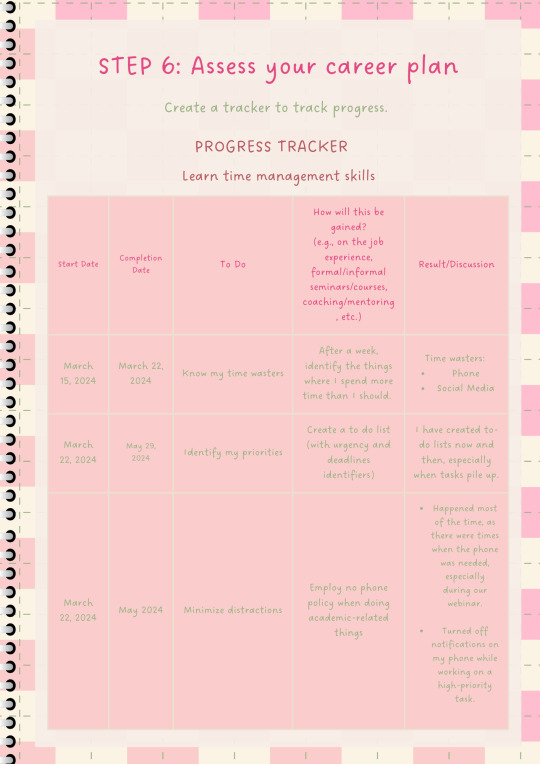
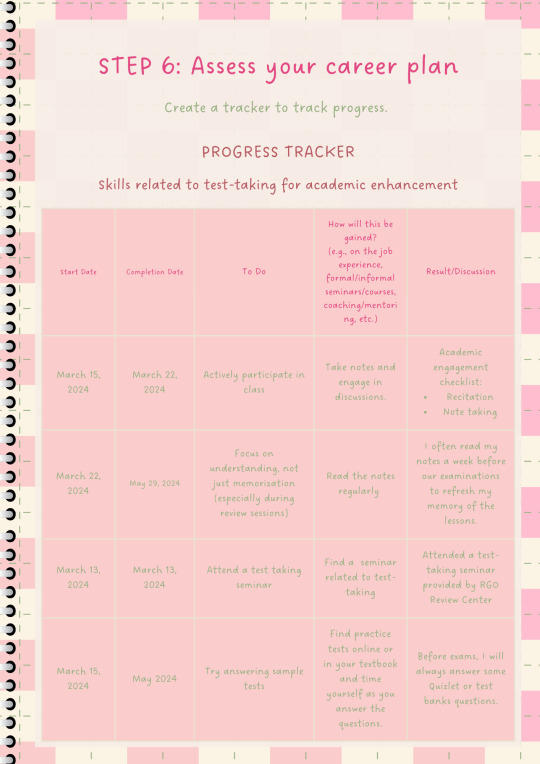
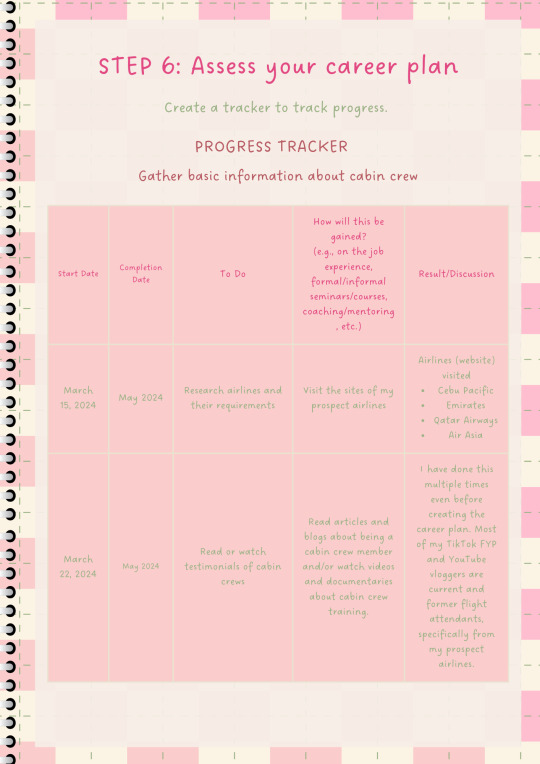
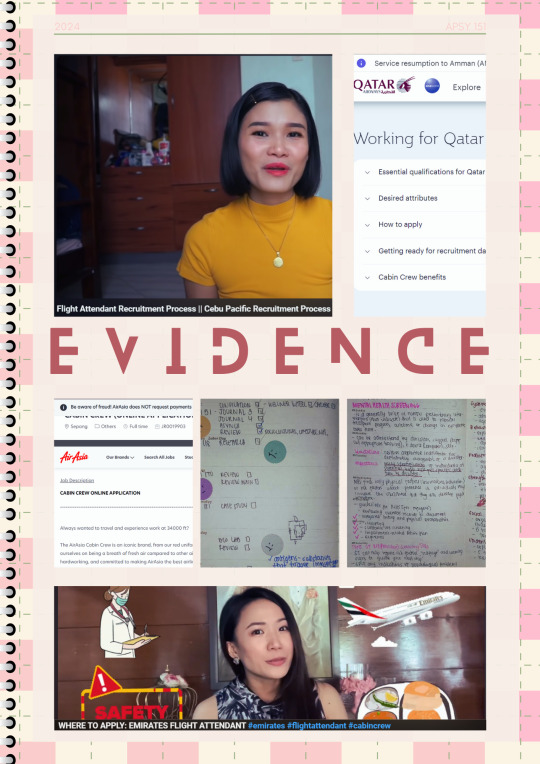
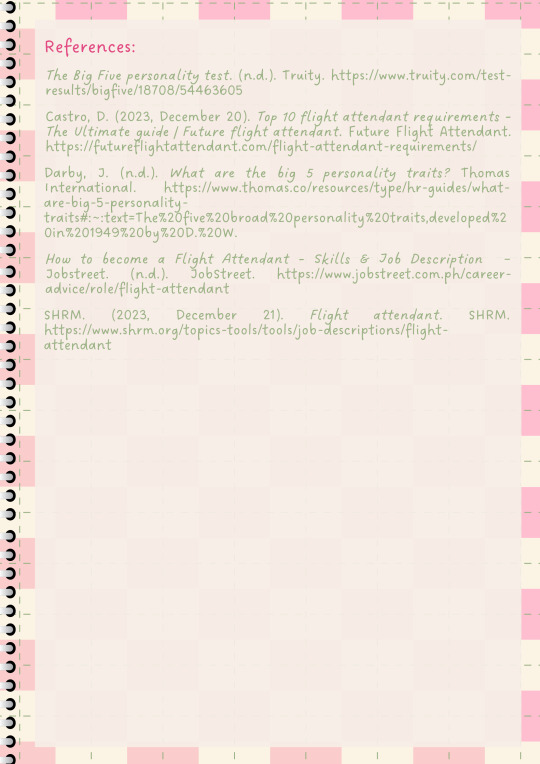
youtube
0 notes
Text
DEPPortunity: An Online Opportunity Corner
Come and join us as we look back on the success of our advocacy project!
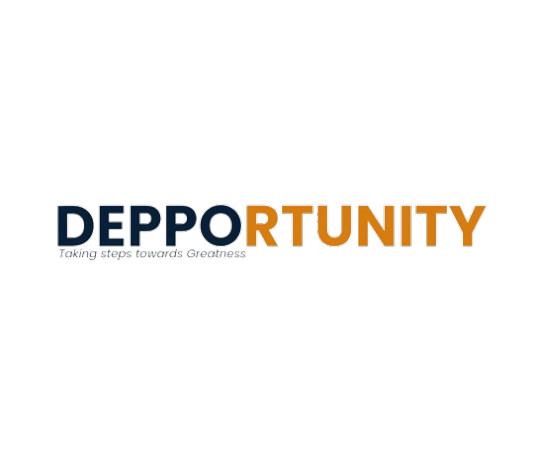
DEPP·ortunity
: an online opportunity corner dedicated to providing seminar, course, job, and internship opportunity updates for UPDEPPO students.
This advocacy project helped me realize a few things: · Helping others helps you help yourself. Helping others find their perfect opportunity through DEPPortunity leads to fulfilling essential learning characteristics for my personal growth and well-being.
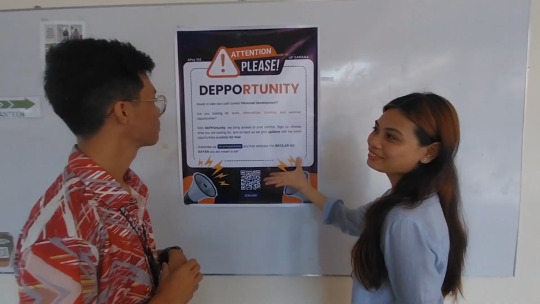
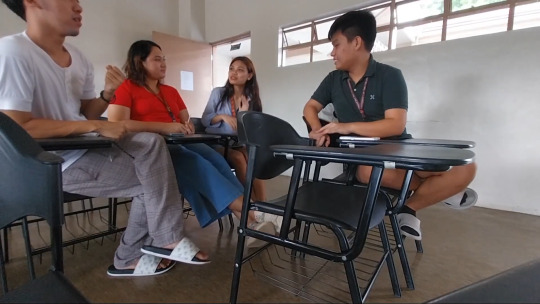
· No man is an island, collaboration and teamwork are essential for success. Creating and maintaining a platform like DEPPortunity requires both of us. I had to work with others to gather information/opportunities (job, internship, seminar, course), develop the platform, promote it to students, partner with organizations, send emails, etc. Experience like this highlights the importance of these skills in achieving our advocacy goals and successfully achieving our personal aims too.
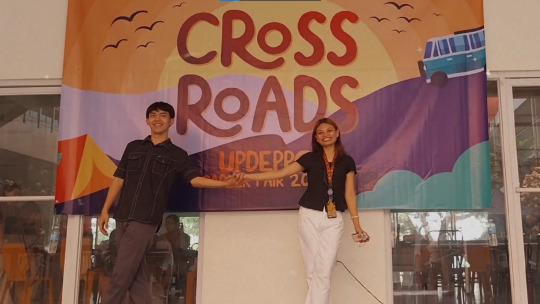
· Establishing and maintaining relationships are essential for both professional and personal development. Owing to this advocacy project, I have connected with academics, professional views in different fields, and UPDEPPO students. Developing and preserving these connections can help me take advantage of new possibilities which often offer insightful support that eventually leads to the advancement of both personal and professional growth.
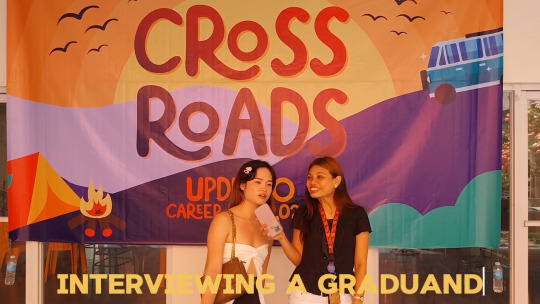

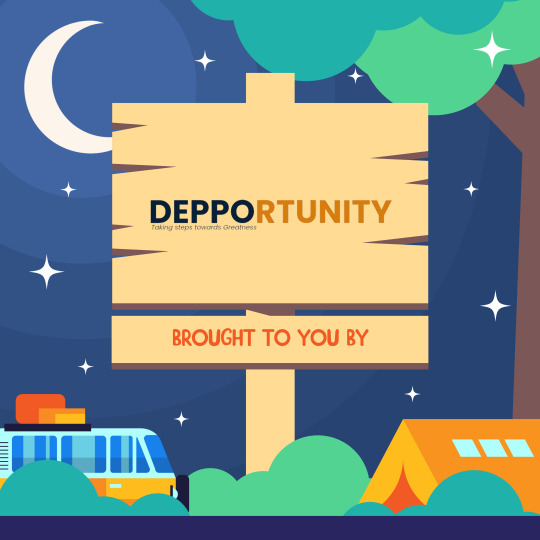
Stay subscribed for more of our opportunity updates. We are not done unlocking your ultimate professional self yet! Thank you for subscribing!
Always with you towards greatness,
DEPPortunity Team
Full journey paper: http://surl.li/uddyy Appendices: http://surl.li/uddzh PPT Presentation: http://surl.li/uderl DEPPortunity Satisfactory Scale: https://forms.gle/wSu2paZw2gYxHRCX9
1 note
·
View note
Text
YOU'VE REACHED THE END OF DEE'S PORTFOLIO
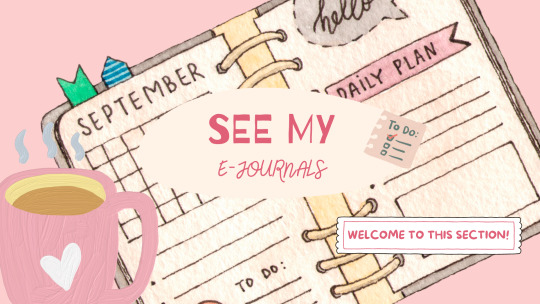
Journal Entries Ahead!
0 notes
Text
Watch My Silent Struggle: The Truth Beyond " I Am Okay"
This is the fourth entry to my e-journal. I am Donna, and to know me better, you can scroll through my past posts!

When I was in high school, my friend, whom I call Lexixa, often told me how my expressions were very transparent in every situation. One can tell if I am happy, excited, hurt, or nervous, and especially you can really tell when I am annoyed. One example is the division-level research congress I was once in. My groupmates, who are my closest friends, told me to better have my face neutral all throughout. Do not show the panelist you are nervous; do not show the panelist you are stressed by their questions and deliberate comparisons, just do not be so transparent! I wish I did, but no, and my friends knew that very well, so they recorded me for proof. As I watched myself, I wondered, could I really show people I could care less about anything they do or say? But, I can't control my emotions, is it even possible to control them? One of my friends taught me this amazing technique that I applied throughout my 10th grade to my senior year! The 1-10 technique. Basically, this technique involves counting from one to ten when faced with very strong or wild emotions or stimuli. Then I would reassess my reaction to the situation after. Most of the time, the result was good. I was able to make a much clearer and more fitting decision if needed. The technique helped me clear my head and focus on positive behaviors that would benefit the alleviation of a situation or stressor.
Growing up, I was plagued by overthinking and pessimism. I grew up being hard-to-please and having trust issues. People's positivity around me often triggered suspicion, making me overthink if their intentions were genuine or if they were hiding some hidden agenda underneath—they were giving me gifts; it was not my birthday or Christmas, so why? Even compliments felt like facades, unable to penetrate my cynicism (Thank you to my Philosophy Professor during freshman, I was able to name my feelings).
Even when hearing the simplest "You are good" made something in me feel uncomfortable, and I would overthink it! I would think of reasons why I am not good and what they were saying was untrue and blurted out of need.
Were they merely attempting to reassure me? I am not sure. What I am sure of is this constant negativity weighed like a really, really thick jacket hindering my capacity to truly connect with people immediately. It took me months to open myself up to my now college friends, we call ourselves Lerma, even though I enjoyed spending time with them during group activities, like in BM 101 class. I still found myself setting limitations and walls whenever I was with them. Even during the first face-to-face meetings during our Sophomore year, I would rarely talk or interact with my block mates, except for Abegail, Bea, and Sean, my constant groupmates, and later friends, during the freshmen year.
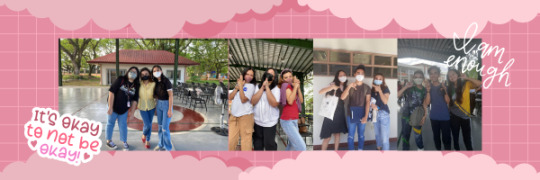
I was never a product of gentle parenting, especially for my mother, a housewife who always took care of me and my other three siblings growing up. I honestly heard that parenting style during the post-covid 19 era, when TikTok boomed. Academically, in my earlier years, my mother was hands-on. She took the quote, “Mothers are our first teachers” seriously. I remember crying during our sessions as I often wrote my surname with some additional letters like d, “arandad,” or sometimes, it was not written completely. I know how hard it was teaching children, especially since I experienced that now with my nephews, but Mama never gave up on me. She also encouraged me to do my homework, cutting the illustrations on the book, pasting pictures, drawing, colouring (with no extra color outside the illustration), and my least favourite at that time, writing or tracing the lines. But despite these activities feeling less attractive and taxing for the little me, name practice and line tracing helped me form other letters and finally write sentences. I also learned how to listen and concentrate from Mama when I followed her directions for my homework, which was very beneficial in the classroom. In retrospect, I see how my mama's early academic initiatives set a solid basis for my education, especially during elementary. Socially, I could say I have little people around me, as Mama never let us go outside to play with the neighborhood kids. If she said we should sleep at noon, we would, most of the time. Sometimes, my little sister and I would sneak around when she fell asleep first. The last thing we knew, we were running for our lives, rushing inside our home while Mama was getting the Red Santan's branch to whip us with! She would hit us in our tiny little feet with them!
Following most spankings, even the ones that did not involve the Red Santan incident, there was an unspoken understanding. As soon as Mama called us to eat, we would put on a front of normalcy. It was like nothing had happened, and we were a happy family once more. I suppose this silence was a cultural norm in our Asian household, stemming from the strict hierarchy we grew up with. Parents held absolute authority, and children were expected to follow without question. Considering also that we shared a compound with my father's mother. Hence instilled in me a deep respect for elders, a value that was never taken lightly.
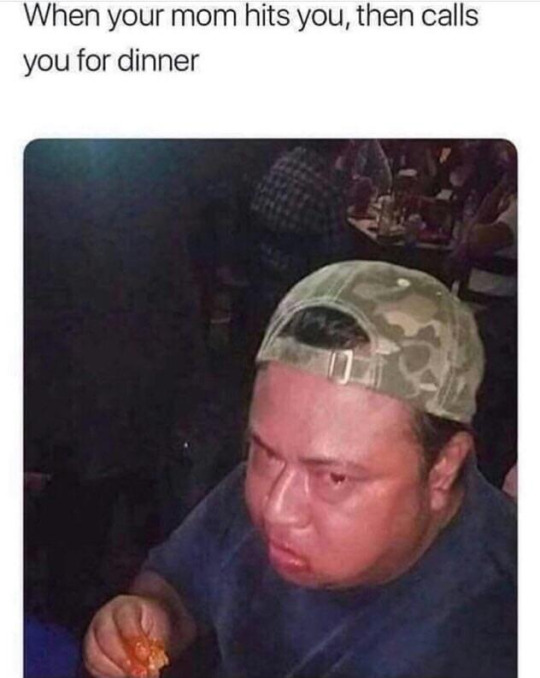
This unwritten code of conduct, coming from an elder-respecting culture, had a significant influence on the way I view the world. Without open communication, trust became a delicate commodity. How could I fully rely on someone who wouldn't acknowledge a problem, let alone work through it? I was afraid to communicate my actual feelings because of the ongoing mistrust that the silence brought about. I was always on guard because every time I felt a little close to someone, my mind talked to me and made me realize that vulnerability is always a liability.
But, you know what? The things my family did were not at all bad. It actually builds me to be tougher, more adaptable, and more resilient in the situation I currently face. To which are invaluable to me as I work through the hardships of life. Currently, I am on the path of learning little by little to develop a relationship of trust and healthy communication, especially when there's tampuhan with them.
However, limited social connections, trust issues, and fear of vulnerability are some of which I know are ingrained in me the most, and are not the ones I want to focus on right now.
These past few months, my emotional capacity has been testing me, with constant pessimism, overthinking, and how I handle situations emotionally certainly not helping my mental health recover. There was a time last March 2024 when I felt I could not control my emotions and it became evident in people's eyes. Last March, I took a headship in one of the committees at an event on our campus, UPDEPPO. It was the Programs Committee, the one busy before, during, and after the event. Before the event, I prepared the documents for an organized delegation of the tasks among the members. It was easy to compile the documents, what was hard was the delegation parts, because I wanted to distribute it so to save some time, but I wanted also to hear their opinions about the tasks and volunteer on the tasks they thought, they knew, they could do properly. Hence, a committee meeting was held. After the meeting, we had successfully come up with the proper delegations among the committee. Until I received a late notice announcement. Apparently, there were last-minute changes to the tasks with a very tight deadline. As a girl who experienced overthinking as if she was paid to do so, I panicked! How would I know such a thing? I was not aware there was a group chat for heads, I was only added when the deadline was only a day away. Fortunately, we finished the task just right on time for the presentation.
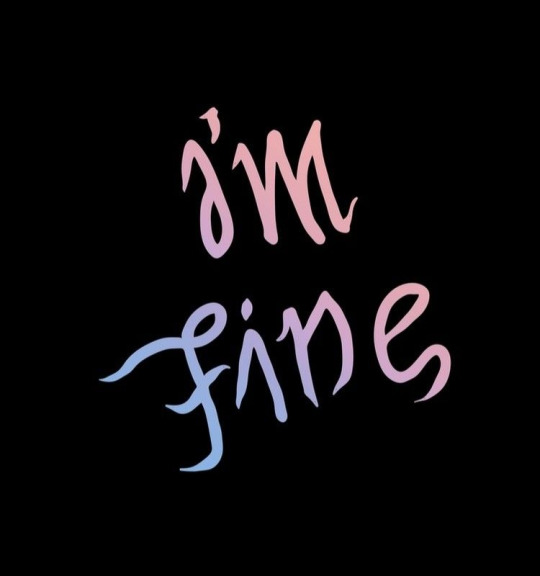
**read this upside down
Being one of the heads of a face-to-face vent is truly a sacrifice and requires a lot of passion to surpass the challenges. Instead of going home to Olongapo, I had to stay in Dau, Pampanga and prepare for the event in the morning. My org-mates and I had to make sure everything was perfect, and all the needed materials were in place for the anticipated event coming up. Of course, I had to wake up as early as 5:00 AM to go to school as early as we did the designation of our organization. We arranged the place, and we made a lot of efforts to beautify it and make it enticing for the students passing by our place. It was tiring but super fun and memorable, though. Also, one thing I am thankful for during this event was the testimony of our new members' love and dedication to the organization. It is also safe to say that we became much closer with each other during our time of working with one another. We learned more about what their personality is like, we got to talk about the organization, new members got to meet some alumni, and we got to have our reflections after each event we accomplished.
It was during the event that my emotions burst and became wild. As the very first activity drew closer, I could not think of anything else but to catastrophize and fortune-tell about the worst case scenarios—someone might be injured, and I would be the one responsible, or someone might not enjoy themselves. This continued for the succeeding activities as well. I even worried that if one contestant was out, it would be a disaster. What I didn't realize was that I was subscribing to all-or-nothing thinking.
To make matters worse, there really was a disaster! There was a great deal of arguing and confrontation during all four activities we conducted. The contestants were competitive, which was something we encouraged, but of course with limitations and while valuing the essence of the activity—to enjoy and take a break from their academic life. But to no avail, there was no activity we headed that was without any arguments or questions. What made me feel off was the fact that one of the organizers, the head, was also joining in the argumentation, picking sides, and making this more chaotic than ever.
Because of this unforeseen (well, I foresaw it, but I just didn't know it would actually happen) situation, my emotions, like the competitors', heated up, and I suddenly couldn't be happy and bubbly throughout the event. One of my friends, who is also a head organizer, pointed it out and said I looked upset, which wasn't ideal. I shouldn't show them that I'm not okay with the setup. That, if anything, I should not show, at least to our new members, it was not understandable to be disappointed that the activity we prepared for so long and with great effort would not go through due to time constraints.
On the contrary, my other friend said I should let my emotions out. They argued that if I didn't, they might pile up and eventually cause me to burst, which would be much worse. This friend told me it was okay to feel that way and that it was normal to react in a certain way based on the driving stimuli behind it. In other words, they were saying it was okay not to feel okay. It was okay to show that sometimes there are down times, and that no one or nothing can always lift your spirits high.
Thus, I would like to reiterate that I do not want to discuss for now the social connections struggles I faced, the trust issues, and the fear of vulnerability. Instead, I would much rather focus on my emotions and how I can improve as I navigate this challenging semester.
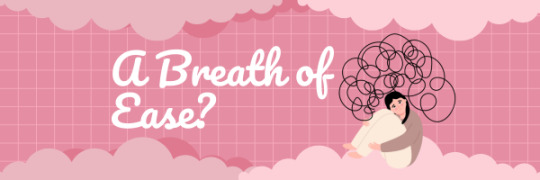
I have experienced a wild wave of emotions this semester, anxiety, disappointment, etc., which has compelled me to face my own destructive thought patterns and to thoroughly explore techniques for regulating my emotions. I call this my self-discovery phase, which has been extremely helpful to me, especially when I pursue a career related to psychology, as it has given me insight into the inner workings of the very difficulties I aim toward helping or assisting others with overcoming.
An obvious pattern in all of my encounters is the conflict between acceptance and maladaptive tendencies like catastrophizing, all-or-nothing thinking, focusing on the negatives, fortune-telling, etc. The pressure to provide an outstanding "perfect" experience during the UPDEPPO event led to various "what-ifs" and worst-case scenarios. This experience of mine is consistent with the way our thoughts deceive us and form negative, adverse thoughts that aggravate emotional suffering. These different points of view of my friends portrayed how important it is to identify these common misunderstandings. One friend encouraged me to keep up a positive front for my own reputation and to think about others, especially our members, while the other friend pushed me to be honest about how I felt. I remember them making some loud suggestions, almost indirect parinigan, while we were having dinner after the event. I honestly thought they would argue; luckily, both of my friends just shrugged it off. But, these two viewpoints do wonder to me; I thought about it and asked myself: is it always better to repress negative emotions or dissatisfaction, or may holding it inside cause an even bigger bursting of feelings left unexpressed and unsaid?
My views on emotions have been called into question by this experience. Perhaps the ability to be honest and upfront, even if it involves occasional mood swings, allows for stronger bonds to form. However, this is only valid in moderation. My note-to-self is that I should use the more healthy ways I have learned to express my emotions. Because I realized that sometimes, there are feelings left unsaid to anyone. I realized that not everyone should be explained and justified as not everyone would understand. Rather, my emotions should be appreciated and valued, and when I know they will not, they should not be exposed. This speaks to the idea of emotional intelligence, which is important for any profession that involves providing services to people, such as my dream career as a flight attendant. In addition to building relationships with passengers, my role as a flight attendant would involve establishing a welcoming and comfortable atmosphere for those from different walks of life. Emotional intelligence would allow me to explore and learn from challenging situations, ensuring a smooth and comfortable flight for my future passengers on board. This goes to show that learning to handle my emotions will benefit me in my future endeavors, honing me to be understanding and empathetic for others and myself; it will hone me to be a professional.
I could say that my awareness of emotional control has expanded these past few months, considering the rough months it has been for me. I found that using the 1-10 method, which I picked up from a friend, is a great way to stand back and gather myself and my thoughts. I would try to count every time I needed to calm myself down from breaking down. Also, I employ breathing exercises (which are included in the task I made to enhance my emotional dimension). I actually added the emotional dimension because of the stress I felt during the event. That was the moment of enlightenment for me. My reaction to the stressor/stimuli showed me how badly I handle my emotions and how negatively it affects my mental, emotional, and even physical well-being.
I would also employ writing my thoughts in my diary, organized in the small notebooks I have loved to collect since junior high school. So, I felt like I was revisiting the old life I had whenever I was writing on them. While writing, I would listen to meditation, classical, or yoga music, which was also beneficial when reviewing for an exam, as I am the type of person who cannot thrive in silence and is driven by some sounds, but not noise kind of thing. I just prefer listening to some background music while working with my brain. Which also helped make me enthusiastic and optimistic about what I am doing.
Building on the foundation of Cognitive Behavioral Therapy, CBT, concepts we learned starting from freshman year up to now, this experience has motivated me to manage my problems by changing the way I think and behave in adaptive ways. Thus, my reason to join and further develop my DBT skills led by the Apsy professors strengthened, especially those related to distress tolerance and emotional regulation. Practicing mindfulness, as one of the professors said, is "not easy to do at first but will be handy when practiced", and challenging distorted thinking patterns will be key to my goal of adaptive emotional regulation. I also became interested in exploring how to create a safe space for people to utilize radical acceptance and validate their full range of emotions in a therapeutic setting.
However, despite the hurdles, I am appreciative of the lessons I have acquired, both personal and academic this semester. They have forced me to face my own emotional weaknesses and fueled my desire, with a little bit of curiosity, to learn more about the intriguing field of emotional regulation. I have no doubt that this increased self-awareness will help me in my career, be it psychologist or flight attendant, by improving my ability to relate to and assist my future clients, as my ultimate goal in life is to work with people and work for the people.
I have discovered a sense of easy openness and a desire to explore into human emotions. "I am okay. Am I?" is the question that leads me to assess myself; it is not a question that asks for approval but rather one that encourages ongoing reflection and self-growth. The answer, I believe, is a constant work in progress. But with each honest expression, I move closer to a place of true emotional well-being. But with each hurdle overcome and each lesson learned, the answer becomes clearer. Yes, I am okay, and I am getting better every day.
youtube
0 notes
Text
Blooming In My Social Soil: How Society and Culture Affect Me
This is the third entry to my e-journal. I am Donna, and to know me better, you can scroll through my past posts!
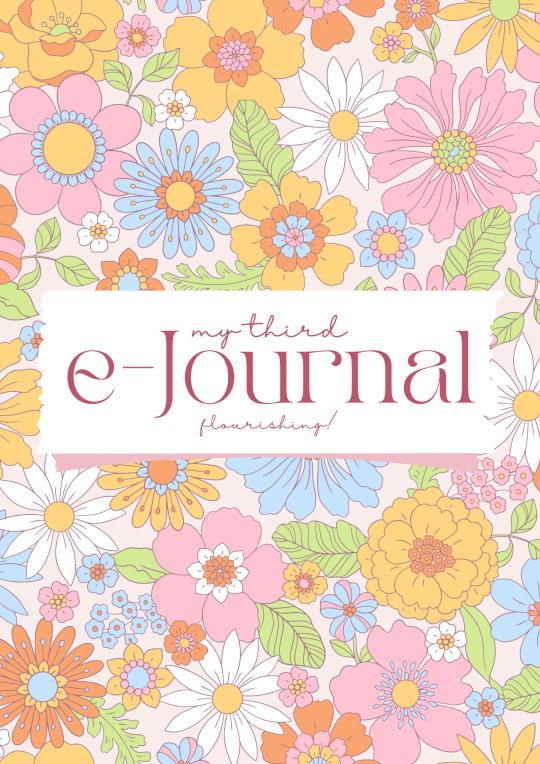
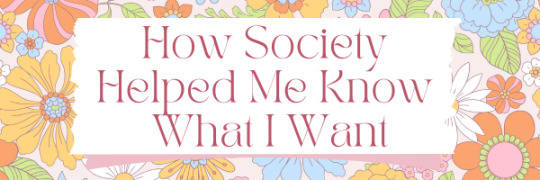
Did I ever mention that I am the eldest daughter with two eldest brothers? It was fun, really; the power dynamics, the favour, the role model until the storm of expectations and pressure came in. As they say, mothers loved their sons and raised their daughters. raised their daughters in a way that society would accept them. Due to my gender, I am expected to take on more responsibility domestically, act as mahinhin as possible, talk as a lady would sound, and even sit demurely. Even argued that these would make me get a husband, to whom I can dedicate my life, a traditional tender Maria Clara, a true epitome of dalagang Filipina. If you are familiar with the GMA TV Series Maria Clara at Ibarra, you will notice why I identify myself as Klay, Barbie Forteza's role.
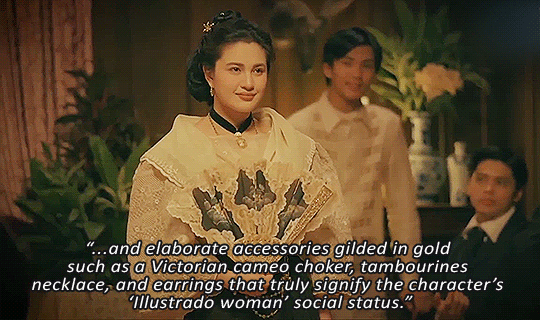
I was kind of the center of attention and a main character in the family because I was the first granddaughter, especially to my paternal grandmother, nanay Angge. I'm very sure that practically everything I did was captured on a digital camera, including my first time using a walker, standing up for the first time, taking my first picture, and even eating things like my uncle's phone! How thrilled was my nanay? Well, she was the one who got me baptised!
Bronfenbrenner's Ecological Systems model explains how my family shaped my early years. My closest circle (microsystem) included my parents, grandmother, brothers, and aunt/uncle. The large age gap between me and my brother Roden placed him in my mesosystem, connecting our immediate environments. My mom's stories about their playful competition to babysit me illustrate this early influence. Though playful, it showed their nurturing instincts, even if it lessened as I became more independent.
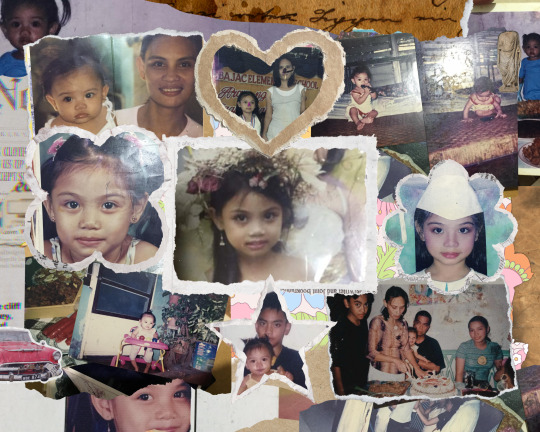
In my first years upon my birth, my family fostered a strong sense of security and support for my development. My father provided stability while working, and my mother, a full-time homemaker, showered me and my three siblings with affection and full attention. Her close circle of friends, my Ninangs, who constantly doted on me, also enriched my early years. This focus on family, my microsystem, a core value in Filipino culture, extended beyond our immediate household. My grandmother, aunt, and uncle lived in the same compound as us and actively participated in my upbringing, ensuring I was never far from the helping hand of a relative. Even traditional child-rearing practices, like prioritizing a mother's immediate response to my needs, reflected this cultural emphasis on close bonds. Thus, I can say that the constant support and affection built by my microsystem and mesosystem laid the foundation for the strong relationships I cherish today. However, despite the loving environment of my childhood, I noticed that a seed of gender inequality or gender role norms was unknowingly ingrained. My father's decision for my mother to stay home, while he provided financially, ingrained in me the traditional idea of gender roles. This aligns with the feminist theory when it comes to the domestic sphere, which looks at how unpaid domestic labour, or the labour of love, often performed by women, is undervalued and most of the time, overlooked, compared to paid work. While I appreciate the security and attention my mother's full-time dedication provided, feminist theory opened my eyes and allowed me to challenge these norms. It allows me to recognize that both parents can be successful breadwinners and care providers, cultivating a more equitable and fulfilling family dynamic within the microsystem and mesosystem. That understanding gives me an opportunity to envision a moment when personal strengths and preferences, rather than gender, will determine household duties and professional goals. It is important to note that all I want is to be independent and financially secure on my own; I don't even want to start my own family, not anytime soon, as what my mother often prepares me for. I am aware that many people still live by the sexist notion that having children is the essence of being a woman, but I believe that women can influence society in a variety of other ways owing to our intellectual capacity and gracious hearts. Like Klay, a character who redefined femininity, I am a true Filipina but a modern Maria Clara, and no stereotypes can hold me back from embracing my heritage while forging my own path.
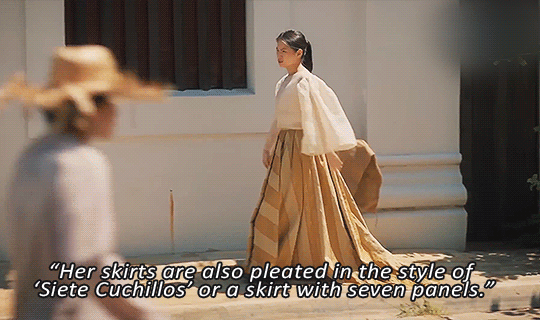
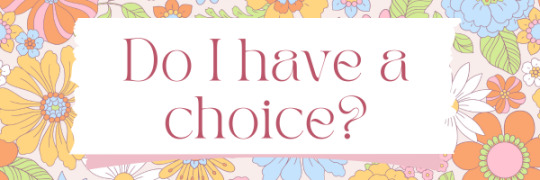
Growing up in a Filipino-based culture has instilled a unique blend of strong mindset and challenges in my journey of personal growth. The phrase "bahala na, may plano si Lord" gives off a positive approach to adversity. I see it as a cultural coping mechanism that allows me to believe that a higher being will help me, thus making me persevere even in difficult situations (do your best, God will do the rest!). This quality has undoubtedly played a role in my journey in the academe. When faced with the slightly unexpected challenge of being placed on the unfitting, technically my fault, academic track for my dream career as a flight attendant, I channelled my "bahala na, may plano si Lord" spirit. The most difficult part of my educational endeavour happened when I entered senior high school. I thought that the best way to be a Flight Attendant was to pursue the academic track, HUMSS. Little did I know that the ABM strand was more appropriate, as it is under the Business and Management field. Naturally, after learning this, I pleaded and asked the institution if I could shift, but because of the strict management, nothing happened. I still remember the Prefect of Discipline's remarks on me; he was one of the terror teachers there, so imagine the words delivered loudly I heard! Knowing that there was not much of a choice, my parents made me choose between two things: pursue HUMSS or take a year off. I chose HUMSS and graduated as the overall rank 4 in the whole batch, ranked third in our strand, and second in our class, a testament to my ability to adapt, overcome, and trust the process (AKA God's plan). True enough, it is actually staying in this course that made me decide to pursue the Psychology course, which made me enter the prestigious university, the University of the Philippines.

On the other hand, the famous Filipino culture's inclination to romanticize resilience may also be an unhealthy way of reasoning. There were moments in my life when I felt like accepting the bare minimum and underappreciation might result from the expectation to just get by. I found changing courses was not an easy option in the strict academic system. Even though I eventually succeeded at HUMSS, this experience gave me the will to fight for the things I want. The stage of acceptance took a long time. I honestly feel the strand was not initially an attractive path for me until I found a network of support that taught me to be happy and made me realize that the strand is afterall, worth pursuing.
True enough, I excelled in this course, and I can proudly say that I belong in the HUMSS strand; I am a HUMANISTA. The challenge for my goals was one of the factors in my decision to pursue a degree in psychology. My interest in social dynamics and human behavior was sparked by my success in HUMSS, given our lots of outside activities involving people. I decided to study psychology because of this passion as well as the conclusion that the course you graduate from does not necessarily define your eligibility to apply to an airline—although it may be an advantage to be in ABM.
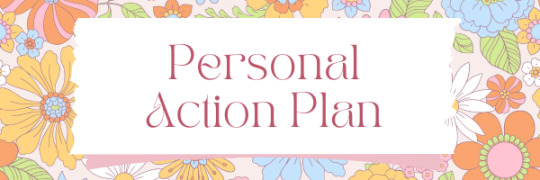

My growth was fostered by my heritage, and the society and culture I grew up in undoubtedly had an impact on me, but I am also learning to achieve a balance between my known traditions and beliefs and my goals as I blossom into a career woman who defies limitations.
youtube
#personal growth#sociocultural theories#ecological systems theory#feminist theory#social identity theory#Youtube
0 notes
Text
ASYNCHRONOUS ACTIVITY
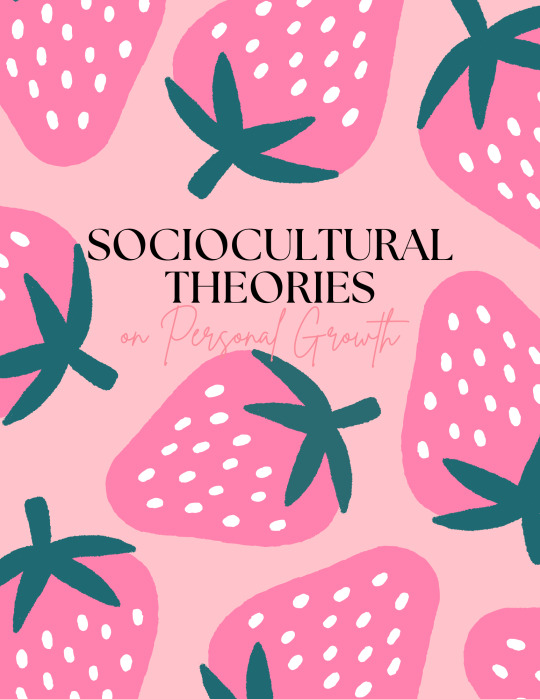
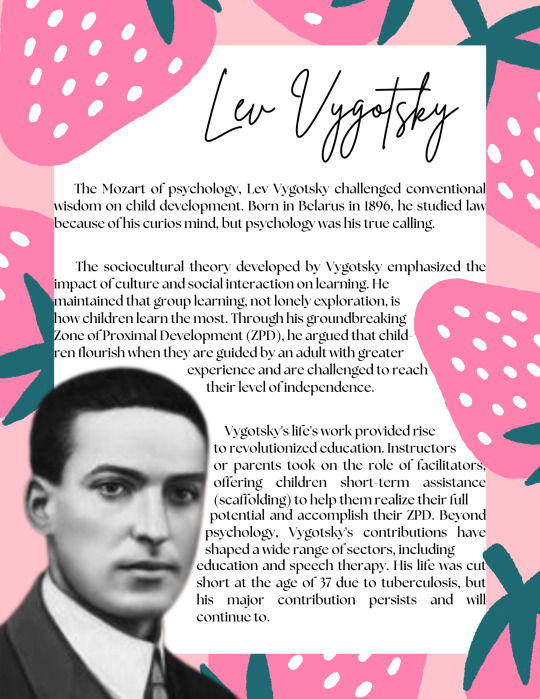
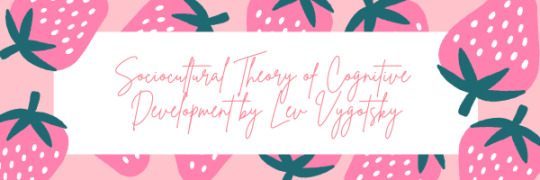
According to Lev Vygotsky, social interactions are the primary means of fostering learning. Interacting with those who possess more expertise than we do helps us learn new things and improve our critical thinking abilities. This could include parents, instructors, peers, or anybody else who possesses a deeper comprehension of the subject at hand.
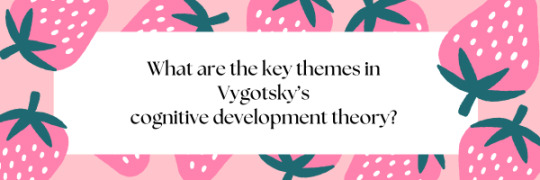
When I first read Lev Vygotsky's theory I thought of the saying "No man is an island". I felt like that was the core idea behind his theory. Basically, he believed that social interaction is essential for learning. He believed we learn best by getting knowledge from others, particularly those more knowledgeable than us. He called this the "Zone of Proximal Development" (ZPD), or the gap between what one can do on their own and what one can achieve with a little help from someone professional. This someone could be their parent, a teacher/professor, or even a peer. The role of these people according to Vygotsky, is like being one's learning coach—offering scaffolding, a process through which a More Knowledgeable Other (MKO) provides support initially so that a learner can work independently eventually; they also help one reach their full potential.
Vygotsky also believed that the culture one grew up in affects their learning as well. We know that every culture has its own methods of teaching and learning. In the Philippines, many parents are often strict when it comes to teaching their kids the basics (writing, reading, counting, etc.). This emphasis reflects the country's strong value placed on education, aligning with the priorities of many Asian neighboring countries. Vygotsky believed that the way a culture interacts with the world and transmits knowledge shapes how individuals within that culture think and learn. In our country, it is hard to find jobs as they are strict in the educational background, which often becomes the talk of the country, as many think some of the strict educational requirements do not capture the nature of the job being sought, and that they do not necessarily reflect the actual skills needed for the positions.
Sociocultural theory also emphasizes the influence of language as an essential tool in one's learning process. Children first acquire language and cognition independently. It is believed that language is a potent mental instrument that molds one's perception of reality. One organizes data, creates thoughts, and even controls their own behavior by using language to speak to oneself. It is always mentioned that learning is a social process where students interact with people who know more than them. Language plays an essential role in this interaction, as this allows them to ask questions, understand received explanations, and collaborate on different activities—basically, language enables quality communication. This is especially essential when considering how vital the mother language is to a child's education. In the Philippines, educators can use familiar languages (Tagalog, Bisaya, Cebuano, Kapampangan, etc.) to bridge concepts and encourage deeper understanding within a cultural context by starting the learning process in the child's mother tongue. As a result, the foundation for future growth and language learning is strengthened. This should be the case so that we can foster learning and, at the same time, we can preserve our local languages and acquire any other languages, including the English language. Ideally, this should be what is happening. However, the current trend prioritizes English, which can sometimes hinder Filipino children's understanding.
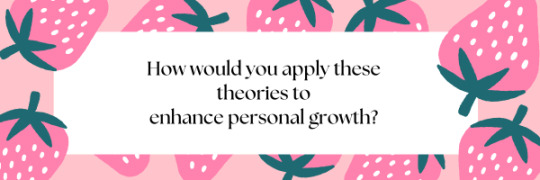
As an Applied Psychology student, we can apply the theory to enhance our self-growth by using the help of the MKO. We can advance our personal development by not only attending classes, but actively participating in courses and paying attention to lecturers and professors. I also find attending workshops or seminars given by licensed psychologists, psychometricians, I/O specialists, and any other professionals advantageous. I believe that the RGO Psychology Review Center's test-taking seminar we had previously this year helped us prepare for our post-graduation endeavors, particularly for the Board Licensure Examination for Psychologists and Psychometricians, which many of us will be taking (BLEPP).
Collaboration, as mentioned, is also very essential. Finding a study group facilitated by joining an organization helped me enjoy the learning process. During my first year in UP, online classes, it became clear that isolation could hinder learning. If you do not have a buddy who helps you with the schedule and such, you will get lost in translation! Joining a sociocultural group within an organization provided invaluable support for a freshman like me. Through interactions with other members, most likely, ahead of us, I received advice and insights that strengthened my understanding of the applied psychology courses. Before each semester started, we would exchange information about professors, their teaching styles, and workloads. This exemplifies the power of social interaction in learning, a key theme in Lev Vygotsky's theory.
To sum up, to become well-rounded Applied Psychology students for the Board Licensure Examination for Psychologists and Psychometricians (BLEPP) and for our future careers, we can use the power of social interaction and cultural context by putting these ideas into practice, after all, we are in the applied field of psychology.
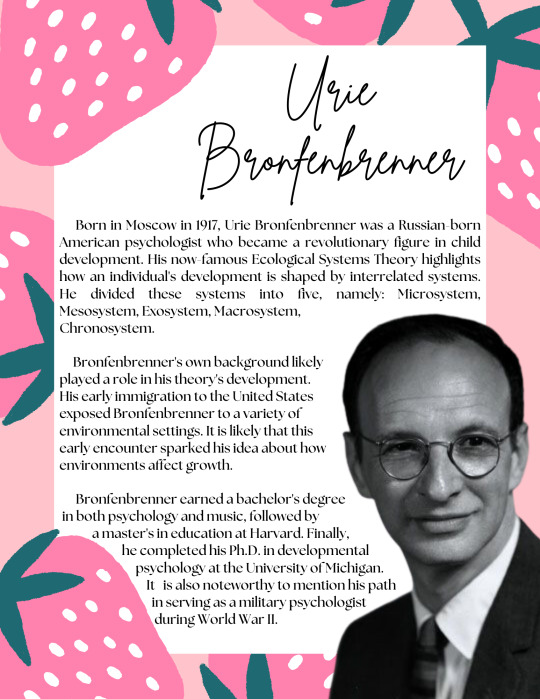
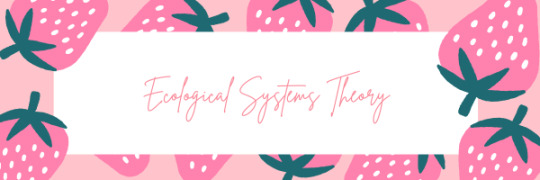
Urie Bronfenbrenner believed that human development is influenced by a series of complex interplay among environmental systems, namely: microsystem, mesosystem, exosystem, and macrosystem.
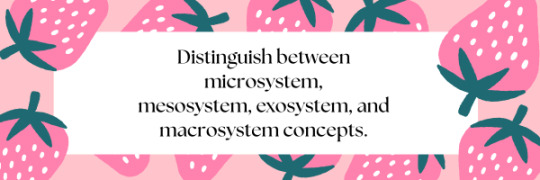
Microsystem - is the innermost layer, and the most fundamental level in Bronfenbrenner's Ecological Systems Theory when it comes to youth development as this refers to the immediate environment where direct interactions occur. Our microsystem includes our family, friends, and school.
Mesosystem - is the layer that focuses on how different microsystems interact with one another. I could say that my parents' interaction with my friend is one of my mesosystems. I could also say that the relationship between my older brothers and parents has affected my development and interaction with my parents through the principle of mesosystem.
Exosystem - is the setting one is not directly involved in but still affects the development, unlike the microsystem. Growing up with two older brothers, my sister and I were naturally strongly inclined to watch my girl cousins and our aunts do their thing. These interactions within my extended family, which are considered the exosystem in Bronfenbrenner's theory, likely played a significant role in shaping my "girly-girl" behavior.
Macrosystem - is the outermost layer in Bronfenbrenner's Ecological Systems Theory. This layer includes the broader historical, economic, and cultural contexts that influence one's surroundings. The culture of celebrating birthdays, going to the memorial park every November 1, celebrating Christmas, and waiting for midnight to welcome New Year are some of the macrosystems that affected my development.
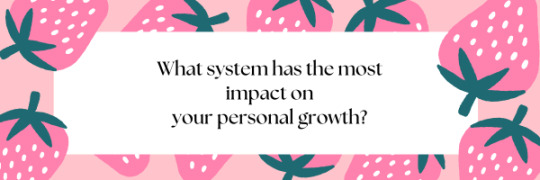
I would say that the system that impacted my personal growth the most is the microsystem. This system has been with me ever since childhood, and I realized that it has been there even when I was not born yet. From my earliest memories of infancy, these individuals—my parents, siblings, close friends,—have been there, guiding my first steps, cultivating my curiosity, and honing my beliefs and values. And the beauty is, that they continue to grow alongside me. They gave me a safe place to explore during my youth and adolescence, supported me when I faced difficulties, celebrated my accomplishments, and helped me solve my problems. As I enter adulthood even now, their impact continues, which drives my development.
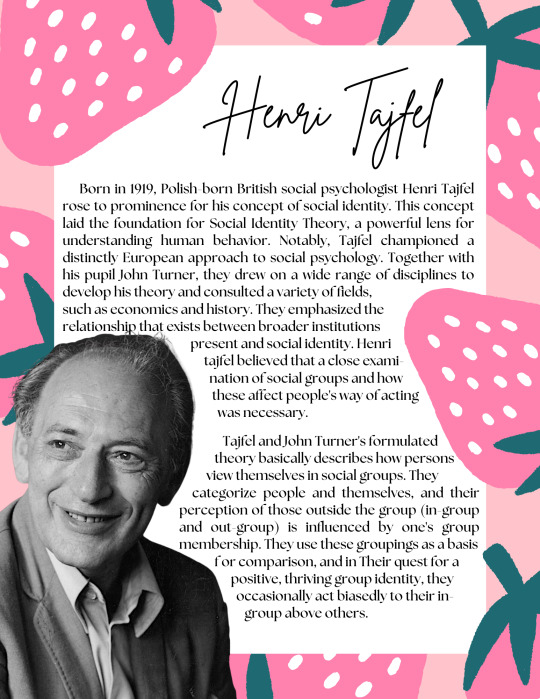

Social Identity Theory was the theory developed by Henri Tajfel and John Turner in the 1970s, which examines how a person's sense of self is influenced by the groups they are a part of. The theory is centered on the interaction between one's identity and their social identity, which is derived from their affiliations with particular groups. The theory identifies three key processes—social categorization, social comparison, and social identification—all of which impact one's sense of social identity.
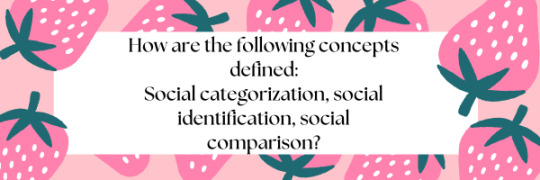
Social Categorization - is the first stage of social identity in which one automatically divides people and themselves into groups according to traits and interests they have in common, such as gender, career, or race. In my case, I could say, I categorize myself as an Applied Psychology student and a multiple-organization member. Sometimes, when one categorizes, one makes a distinction between people who are members of our in-group and those who are not ( the out-groups). This differentiation is essential to one's feeling of belongingness and self-worth. There are moments when one has a tendency to favor members of their own group. For instance, when seeking a job. One would hear some job seekers say, "makukuha 'yan agad kasi may kapit, ka-org niya kasi noong college ang boss." This implies that, even in situations where their qualifications are similar, both of them are job seekers, some view members of their in-group more positively, give them more positive attributes, and even give them opportunities and leverage among others.
Social Identification - is the feeling of being connected to a group and aligning oneself with its values, principles, and norms. One identifies themselves with that of, the group's logo, group brand colors, group's ideals, and stands. I, myself, identify myself in multiple groups I am in. I identify myself as a member of an organization that aims to help students thrive in our course, I identify myself as a member of an organization that aims to promote camaraderie and excellence on the campus through service and leadership, and lastly, I identify myself as a member of an organization that helps students express their individuality through a shared love for arts and entertainment expressions. Through these groups, I have adapted the Discord group study habit, Merch support, wearing organization shirts, and putting a pin on the ID lanyard.
Social Comparison - is said to be a common group life aspect. Group members make comparisons between themselves and other members of their own group as well as between members of other groups. For instance, when I was in a jingle competition in high school, I considered my in-group as my classmates, and we often compared our output with those of the other section. We had this little SWOT analysis even before the event could finish. We analyzed the strengths we possess, the weak links we have, and the things we could have improved in the next event.
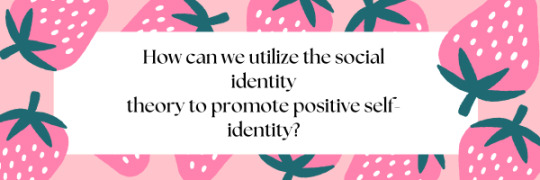
We all crave a strong sense of self, which goes hand in hand with feeling like we belong somewhere. When we celebrate the good things and achievements of our own groups, for example, my organization winning an event last month built a connection and made me feel more proud. But, it is not only our own "in-groups." I believe that by having a group where everyone feels valued and included, we reduce feelings of being left out and create a safer, more accepting space. In our organization, although applicants undergo the application process, we make sure that it is open to all that has the same interests and values as ours. After all, we believe that our group is reflected by its members. But, a positive and accepting group also reflects on its members, boosting their sense of self-identity.

Feminist theory is a broad branch of thought that examines the nature of gender inequality. It delves into social roles, experiences, and power dynamics between women and men across various fields. This theory aims to understand and end the root causes of inequality, sexism, sexist exploitation, and oppression, and propose solutions to achieve gender equality and justice.
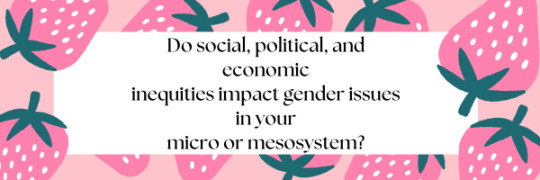
Growing up, I felt pressure to conform to certain expectations based solely on my gender. These expectations, like being demure and quiet, restricted my ability to express myself freely. Then comes the expectation to take on domestic duties upon marriage further highlighting the unequal distribution of housework often associated with traditional gender roles we have. They even go beyond giving advice like, "You should marry a rich guy, so you will be rich." I was like, "Do you not trust me? can't I do it on my own?"
In the Philippines, it is common for women to face expectations rooted in colonial-era perceptions of femininity. The concept of the "dalagang Filipina" (the ideal Filipina maiden) is a prime example. This image dictates how Filipinas should behave, restricting their potential and limiting their choices. Also, the character of Maria Clara in Jose Rizal's novel "Noli Me Tangere" has been interpreted as a satirical portrayal of Filipinas expected to embody a submissive and meek demeanour. This contrasts sharply with the reality and strength of Filipina women. Filipina women should feel empowered to stand up for their beliefs. They should be celebrated for their strength of will and encouraged to pursue professional goals. A true Filipina spirit is more akin to the resilience of our ancestors who fought to survive. That's the cultural heritage we should truly embrace and learn from. Feminist theory provides a framework to challenge these restrictive ideals and advocate for a more expansive definition of what it means to be a Filipina woman. It empowers Filipinas to redefine femininity on their own terms.
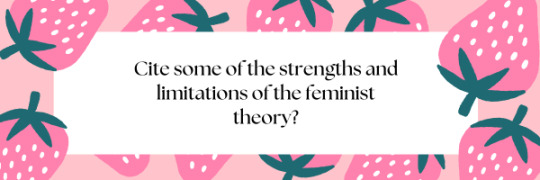
The strength of the feminist theory is found in its ability to highlight how gender prejudices, influence imbalances, and unequal treatment of women may be seen. It aids in our comprehension of how these disparities manifest themselves in day-to-day activities, whether at home, at work, or in social situations. It provides solutions to make the world more balanced and amplifies the voices of women and other marginalized groups.
However, we know that the old, conventional, feminist theory has focused primarily on the experiences of women. Although important, this can ignore the experiences of non-binary and transgender people. Particularly, transgender women are women, too.
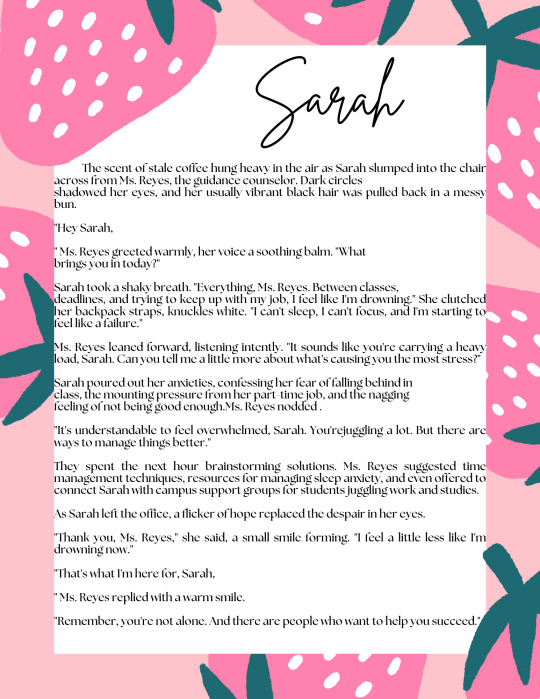
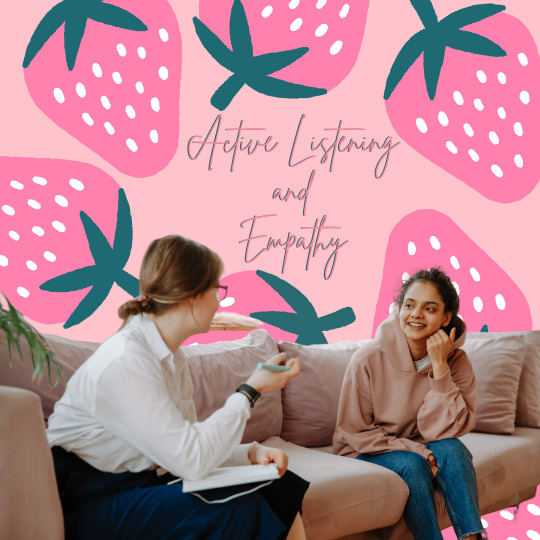

Empathy is what people, especially in our field, cultivate. It is one skill that is essential to communication and helps professionals comprehend the individual encounters with patients. Ms. Reyes employs empathy throughout the vignette. She acknowledges Sarah's difficulties, for example, and extends a warm greeting ("her voice a soothing balm"). Sarah's feelings are also acknowledged by her when she says, "It sounds like you're carrying a heavy load" and "It's understandable to feel overwhelmed." She also reassured Sarah of her presence through this difficult time saying "Remember, you're not alone. And there are people who want to help you succeed." Thus, in the end, Sarah leaves a little less feeling drowned with emotions.
The humanistic client-centered counselling model developed by psychologist Carl Rogers, which prioritizes understanding and empathy, provides the foundation for active listening strategies. It is stated that clients are more likely to be open and the therapist can assist them more effectively when they feel understood by their therapist. In the same manner, clients are more inclined to reach out to a professional who they perceive to be empathetic, which allows the professional to compassionately handle the issues at hand. Ms. Reyes, in the vignette, showed active listening when she established a secure environment for Sarah, which was demonstrated by leaning forward, paying close attention, and listening closely to Sarah. She lets Sarah express her worries without interjecting. I also noticed how she summarized Sarah's words demonstrating that she is paying full attention, which helps the client feel heard and understood
Ms. Reyes' approach is already giving an empathetic and active listening foundation. However, it can be further enhanced by incorporating more leading and probing techniques. She can directly guide Sarah toward particular concerns without prescribing answers by asking leading questions, such as "Have you spoken to your professors or parents about any difficulties?" Additionally, she can dive deeper into her difficulties with the use of probing inquiries that are carefully worded to avoid passing wrong meanings, such as "Is it okay to tell me more about what makes you feel like you're not good enough?" When we incorporate leading and probing techniques, Ms. Reyes can empower Sarah to explore her anxieties and stressors in greater detail. Which will overall result in a rich understanding of her client's case and will allow Ms. Reyes to tailor her support even more effectively, ensuring Sarah receives the most relevant and impactful guidance; much more efficient than assuring her that she will always be there.
All things considered, Ms. Reyes' methods worked well and were suitable for an early session. Above all, rapport-building should come first. It was important to get to know Sarah and create a safe environment where she could talk freely. As the discussion goes on, it would be helpful to include more techniques for getting rich information through questioning and strengths exploration. Thus, I can say that Ms. Reyes exhibits great empathy and active listening abilities for Sarah who is in need.
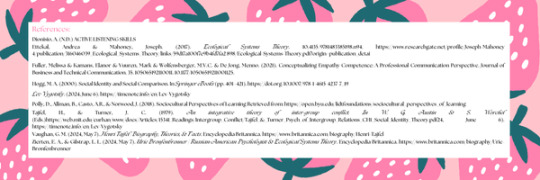
1 note
·
View note
Text
Emotional Revolution: My Hallmark As A Leader
This is the second entry to my e-journal. I am Donna, and to know me better, you can scroll through my past posts!
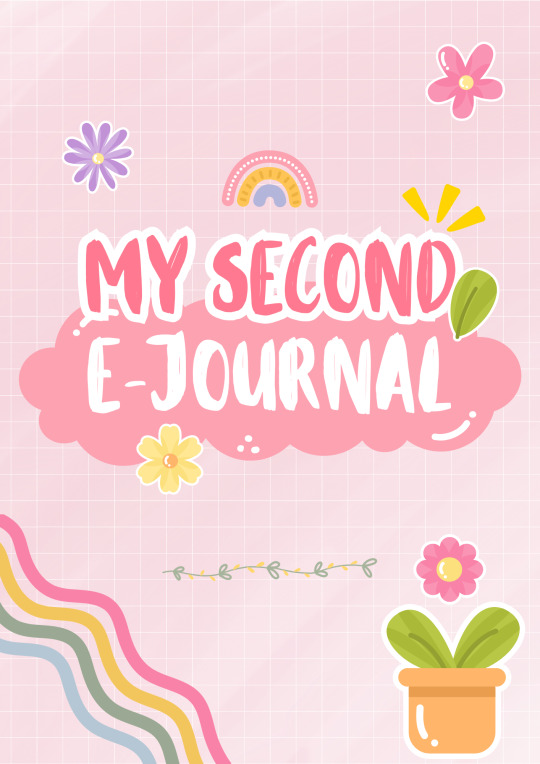
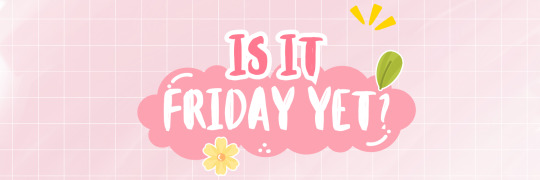
One of the mentioned phrases last time in our Psychology 170 class, Human Development, is delayed gratification. Our professor defines it as resisting the desire for an immediate reward in favor of a better one later. This concept resonates with me, and I mentioned various times I used this approach. For instance, I practiced delayed gratification for the UP Fair 2024. I budgeted and saved, allowing me to have more cash to spend and buy what I wanted at the fair. However, I am realizing I might be doing this too often. Similarly to what I did last February, this semester, I am (or maybe the current life events are) putting off my "happiness" and accumulating negative feelings until vacation break. It could be the stress talking, but I have a feeling the next few weeks hold something good!
The past week has been a relentless and brutal bombardment for me—academic loads and deadlines, family matters require attention, and mostly, personal commitments (organizations matter) pile on. Exhaustion gnaws at my 101% energy, emotions run high, and my focus on many things scrabbles. In the midst of this "hell week," all I can feel is the magnetism of a most awaited long break coming up that it becomes almost unbearable to wait from Tuesday to Saturday to happen.
However, I thought to myself, what if, instead of simply impatiently waiting for my awaited salvation (AKA the long break), I invest in equipping myself with knowledge to navigate these challenging times or at least help myself feel a little bit better to go on and face a lot more challenges ahead? That is, instead of seeking a little less challenge than what I am facing, I embrace these challenges as opportunities to learn and grow.
Mastering Self-Mastery
The saying goes that mothers are our first teachers, and that holds true for me. My mother took a strict but hands-on approach to my education, especially from a young age. I vividly remember her teaching me to spell my name. Her attentive and competitive spirit, mostly during Kindergarten, might be why I loved attending school as early as four years old. I thought it was fun; I got to always write on the board, colour, draw, sing and dance, recite (in all ways), and learn. Yeah, I was a 'bibo' kid. But despite being the bibo kid, I did not graduate valedictorian, not even a salutatorian. I was just active and participative.
In elementary school, the most vividly recalled memory of my highest achievement was being the rank 4 of my class for a quarter. Excluding my vaguely remember being second in first grade, perhaps because my grandmother taught me cursive early. Throughout elementary, I noticed a pattern in my performance. I tended to do well in the first quarter, followed by a decline in the second, and then bounced back in the third. This pattern continued until senior high school, making me wonder if I subconsciously conditioned myself to act upon my academics this way.
However, even keeping an occasional higher ranking, I always managed to be in the top 10 and active in my extracurriculars for different monthly events, such as, but not limited to, Buwan Ng Wika, Nutrition Month, United Nations Month, Girl Scout, Sports Fest, etc. Behind these extracurriculars is my supportive mother, and somewhere along the line, I picked up her competitive spirit a little too well. From then on, the school stopped being my playground and turned into a battlefield for grades and academic achievements. It was not her fault she and my father never pushed me towards specific goals. In fact, even though she was strict before, she never pressured me to be this or that and celebrated every accomplishment. But for me, it was not enough. I became fixated on wanting to be like my excelling classmates, my teacher's favorite students, the role models, the A1.
As a grade-conscious kid, I remember vividly crying during prayers every night, desperately wanting to excel in math. Sure, being "good" was fine, but I yearned for the coveted title of "math wizard!" I still remember how I felt while asking God to give me wisdom to be good at that subject. Perhaps people might find it silly to get so emotional over a school subject. But at that time, for me, intelligence equaled academic prowess and success (i.e. with lots of academic achievement), the kind that earned praise and recognition from teachers. Maybe it was the large class sizes in our small public school that I felt that way, but trust me, that teachers' praise and favor were the reason the same students (whom I considered intelligent kids) seemed to bask in a constant spotlight that landed in every quiz bee and competitions from kindergarten to sixth grade! Every time, I felt a little less below these kids—kids who boosted the morale of our school.
I always thought these instances made me angry with my teachers and their bias toward teaching and guiding their favorite students. These happenings also made me overthink that my teachers do not like me. I remember being a class Peace Officer whose job was to list the noisy and standing classmates. I recall being so dedicated to that position that I even memorized all the policies and homeroom rules that we had; a long list front and back! Being in a position was so satisfactory. I thought that by this, at least my teacher would know I have potential, too! While our teacher was out, I would joke around and even playfully "ship" classmates with each other when I caught them talking or being noisy. Then, when my teacher returned, I would proudly report on the "happenings" and hand a written list of students. However, one time, instead of the positive response I expected, my teacher got frustrated and yelled, 'You should have run for PIO (Public Information Officer) instead!' in front of everyone. At that moment, all I could think about was how my teacher hated me and how this would affect my built potential. Since then, I stopped bombarding them with updates, even though they seemed nonchalant about the incident by the next day. These experiences made me insecure about my teachers' approval and how this might affect my academics until high school.
Recalling this, I realized something. Maybe I was not resentful of my teachers, maybe I was jealous of my classmates. I was envious because, as early as elementary, they got to improve themselves and train to be champions representing our alma matter. I was envious because they did not need to prove themselves to teachers to notice them, just like I did. I was jealous because they were favored. Thus, they were the only ones who thrived in different subject areas, like Math, Science, English, and even Arts, and got offered and had a chance to go to good High Schools. They were the only ones who always competed and represented our section or school, leaving no room for us, average, to stay where we were, just like when we first entered the school. Hence, they were consistently in the Top 1 to 3; legit academics, huh? They were my classmates, never me, the wizard kids in different subjects.
Looking back, it is clear how warped and fixed my mindset was about intelligence. Heavily influenced by my environment, it paved the way for traditional IQ to be the sole benchmark. Now, my definition of "intelligent" has evolved. It is no longer about conventional academic success but rather a more holistic view. I have learned that intelligence is multifaceted, surpassing even academic components of it. It encompasses a variety of forms, and this has led me to embrace and appreciate my strengths. Based on the Multiple Intelligences Scale, I possess high Bodily-Kinesthetic and Intrapersonal intelligence. Also, my colleagues and friends often highlight my improved Emotional Quotient (EQ). I may not have seen it before, but these different intelligences are all beneficial in college, especially for a leader like me.
My goal to develop the most useful intellect I have—emotional intelligence—is what motivates me to make this mindset shift from valuing academic success over personal development.
I am a leader now, but before I came to this position, I doubted and criticized myself constantly. I remember being elected as the head of an executive position in my beloved organization at UPDEPP. At first, I was convinced I could never handle the responsibility; I knew I lacked confidence or lakas ng loob in Filipino, and I knew it would not be easy to handle being an iskolar ng bayan and a leader at the same time. I felt unprepared, and at that time, I believed I never would be. After all, I could barely grasp being a UP student, let alone holding a position in one of the biggest, quality and quantity wise, organization.
But what pushed me through was the trust of the people who voted for me: my org mates and the previous executive committee. They saw my passion and commitment to learning. It was not until my fellow members pointed it out that I realized I had this leadership potential.
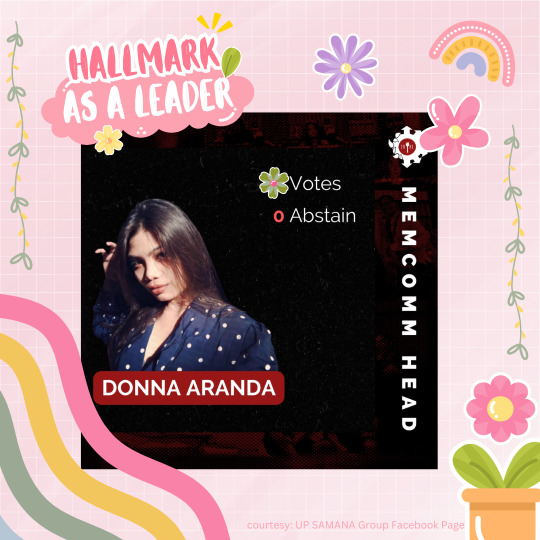
I recognize now the gratefulness I have for them. If they had not given me encouragement and will, I never would have realized my potential. I have discovered that even though I might not have all the information required to be a leader if I had not taken on the position, I never would have. Taking the leadership position forced me to confront those doubts. It pushed me to explore my capabilities and discover a resilience I did not know I possessed.
My personal drive for self-discovery was what ignited, not their ideals. Even though I still have to learn more things about being a remarkable leader, this increased self-awareness motivates me to keep improving. Developing a growth mindset—embracing the belief that I can always learn new things and become more self-aware—burns my flame to understand who I am. By adopting the "there's a reason for everything; I know I can learn from this" mindset when faced with even the hardest obstacles and challenges, I am capable of handling difficult circumstances.
Did I become grit-y?
The lecture with our Psych 170 professor has lightened my burning flame interest in delayed gratification. Even though the idea of recharging on a beach vacation seems good, I now understand how important it is to invest in myself. Choosing to take on these obstacles head-on shows courage. Although I am aware that it will never be easy, I think that in the long run, this experience will make me a better and more competent learner. Through embracing these challenges and developing my gifts during this stressful period, I am embracing perseverance to set myself up for future academic (and, really, personal) success. For now, I will embed in my mind that these short-term difficulties of overcoming obstacles will be oh-so-well compensated with the long-term gain of personal growth, acceptance, and euphoria, much as saving for UP Fair. When I reflect on my early competitive and achievement experiences, I see how greatly influenced I was by validations, external, specifically. A strong work ethic was invested by aiming for high grades, but it also created a persistent sense of self-doubt for me throughout elementary and high school. There were times I felt envious of my A-level classmates who had better grades and were given more opportunities to succeed and bitterness toward our teachers who focused their attention on selected students. Nevertheless, grit became my unseen companion throughout these moments. Even though I was not always the highest student, often the second (as I always aim), my perseverance motivated me to keep working hard in my studies. My grit was strengthened by the disappointment of not being acknowledged, which drove me to look for new opportunities to showcase my abilities. To look for the table where I should be welcomed and properly sat. I did not change my entire self; I changed my surroundings to where I would fit in; I shifted my focus. I learned I cannot control things, so I changed how I will view and act upon these things— hardships—thrown at me; the best decision I could ever make. Delay in satisfaction has been a guiding concept in my life, but grit, I firmly believe, has been the constant igniting force that has kept me moving forward. My reflection has made it possible for me to overcome obstacles, turn discomfort, disappointment, stress, and even anger into motivation for growth, and see failures and losses as chances for lasting success. I know that the road to my goals is paved not only with delayed gratification thing but also with a persistent attitude of perseverance as I make my way through the challenging personal, academic, and professional environment.
To me, self-mastery is not about gaining absolute control over ourselves but about having growing awareness and making choices. Developing a growth mindset has made it easier for me to see that all emotions, regardless of how intense or complex, are natural and acceptable to experience. Self-awareness is, in reality, the foundation of emotional intelligence. I know that by being aware of my triggers, strengths, and weaknesses, I can approach difficult circumstances with more thought, giving me the freedom to decide how I will behave rather than letting my emotions rule me, which happened most of the time in the past. My emotional intelligence allows me to recognize my internal sensations of lack of energy, disappointment, stress, and perhaps underlying fear and anxiety.
Understanding myself and strengthening my self-control, or self-mastery, as I call it, is the first step in managing these difficulties life throws at me. What I would leave you is my reflection that to help us build this strong emotional intelligence requires the development of our self-awareness. As Aristotle said, "Knowing yourself is the beginning of all wisdom."
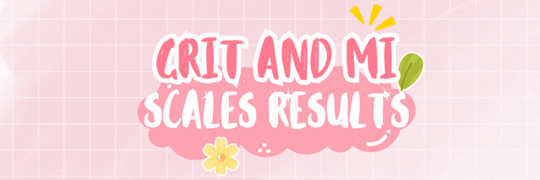
Check my Grit Scale and MI Scale results here:
1 note
·
View note
Text
Welcome to my blog post!
This is the first entry to my e-journal, the Wheel of Wellness or the Wellness Dimensions. To know me better, you can scroll through my past posts!
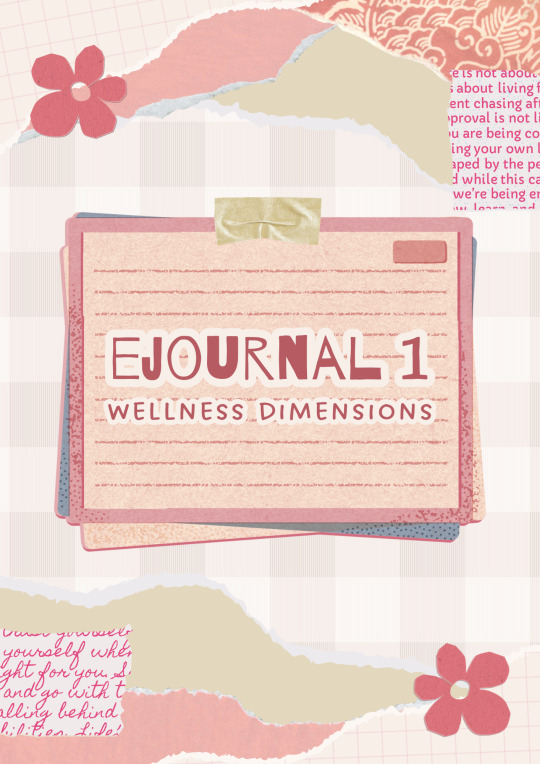
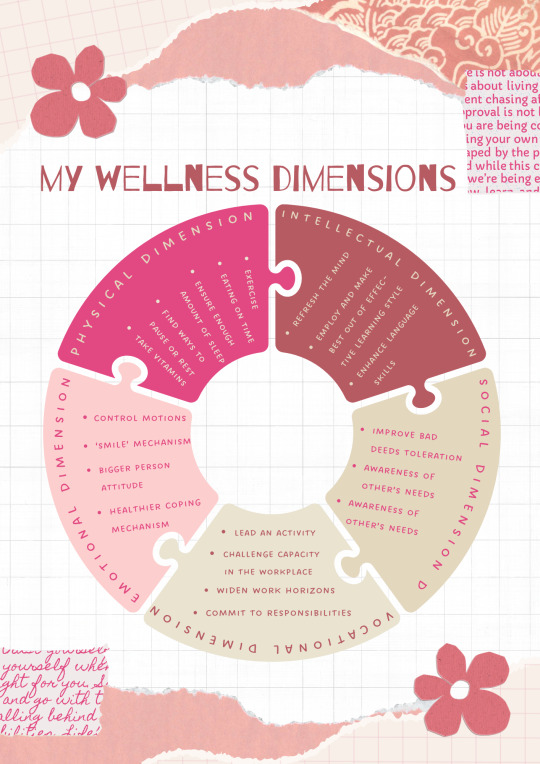
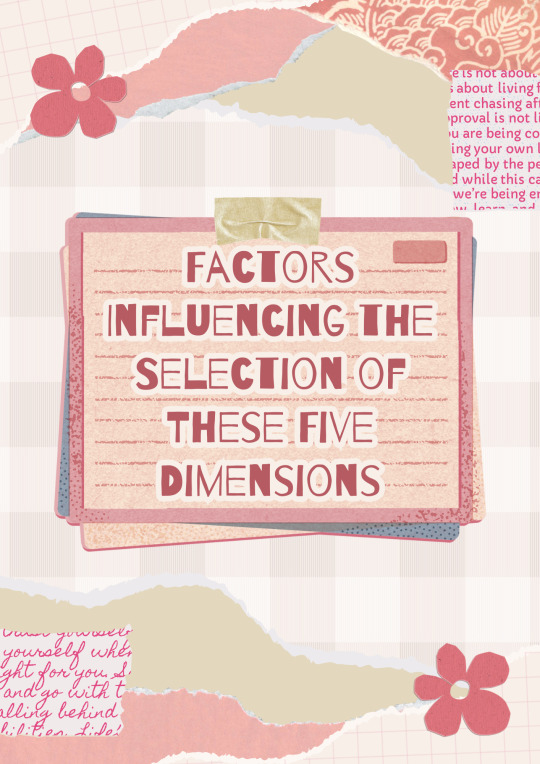
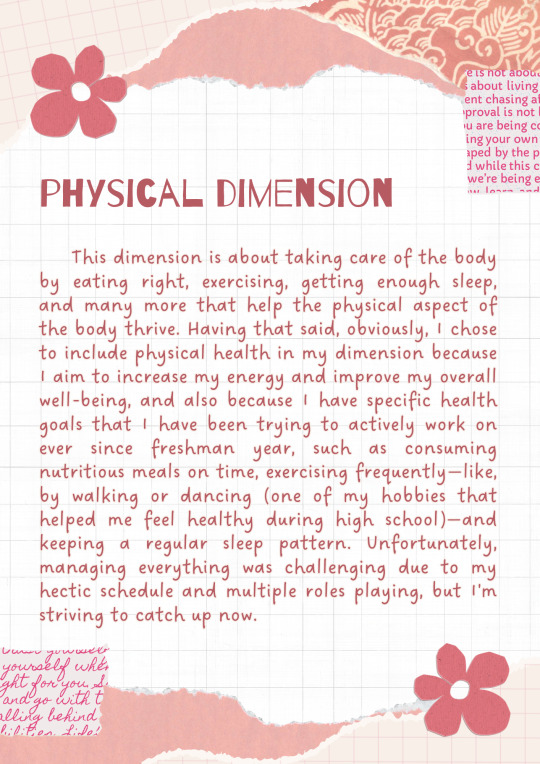
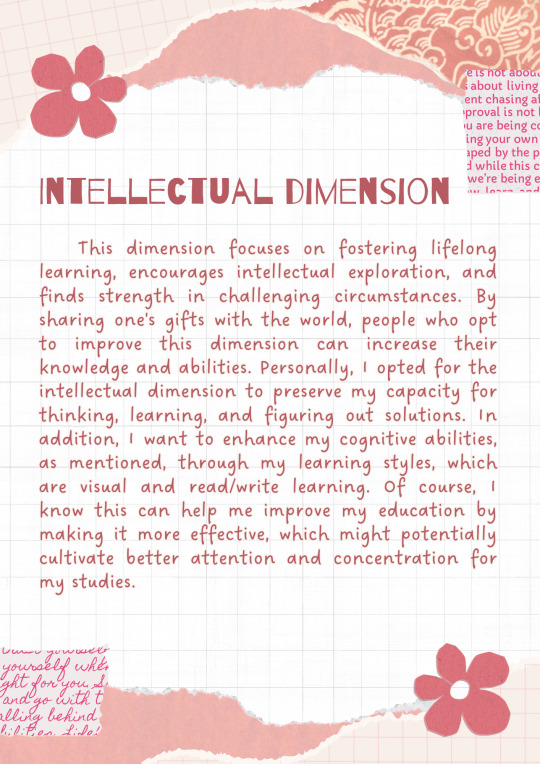
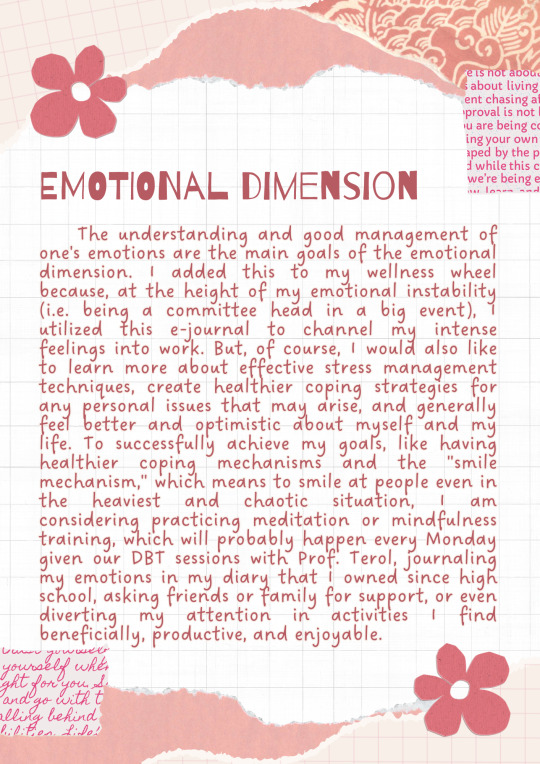
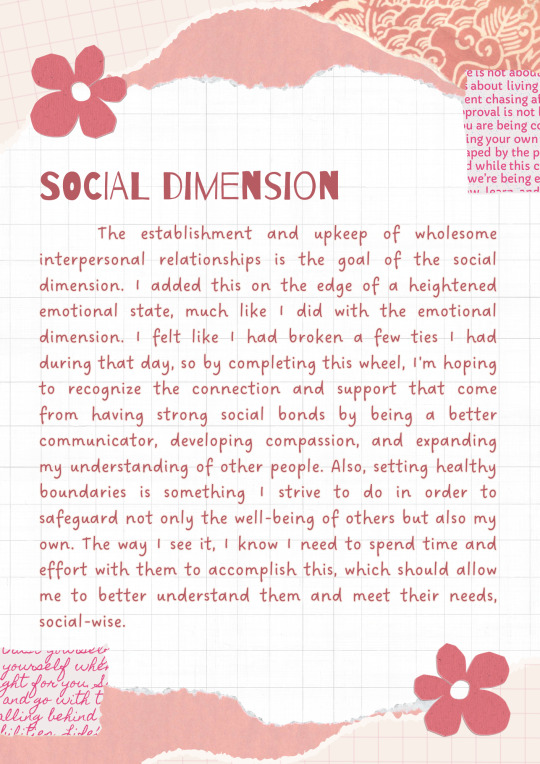
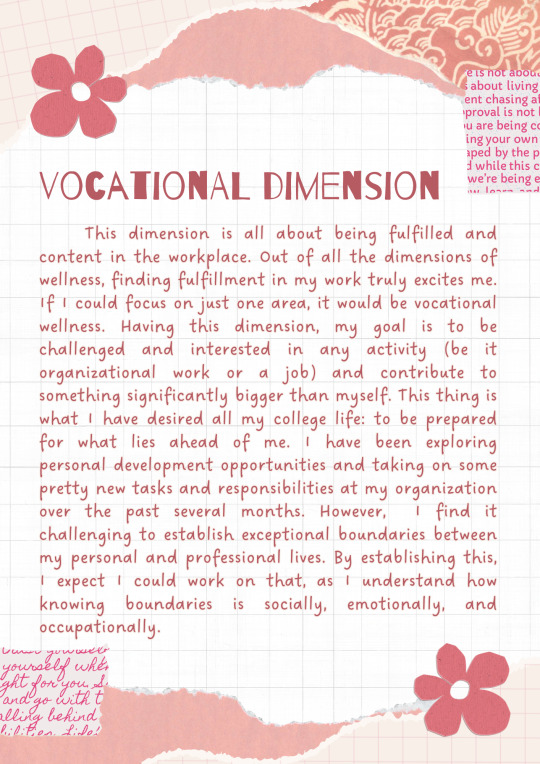
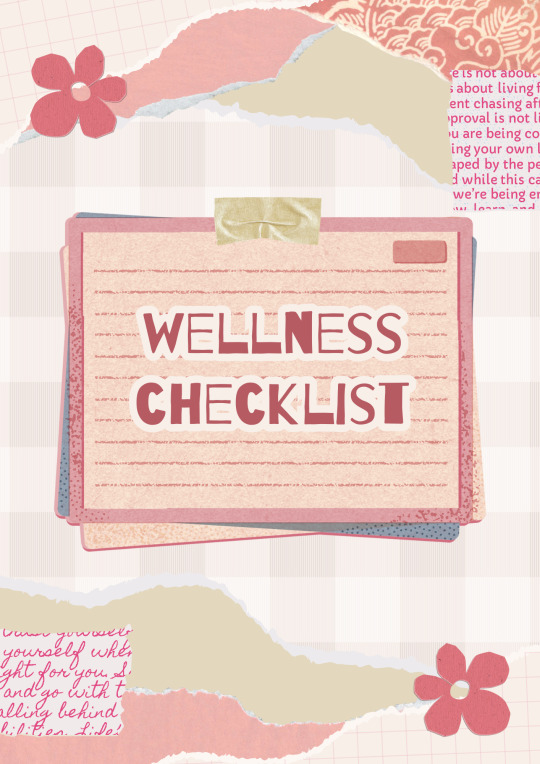
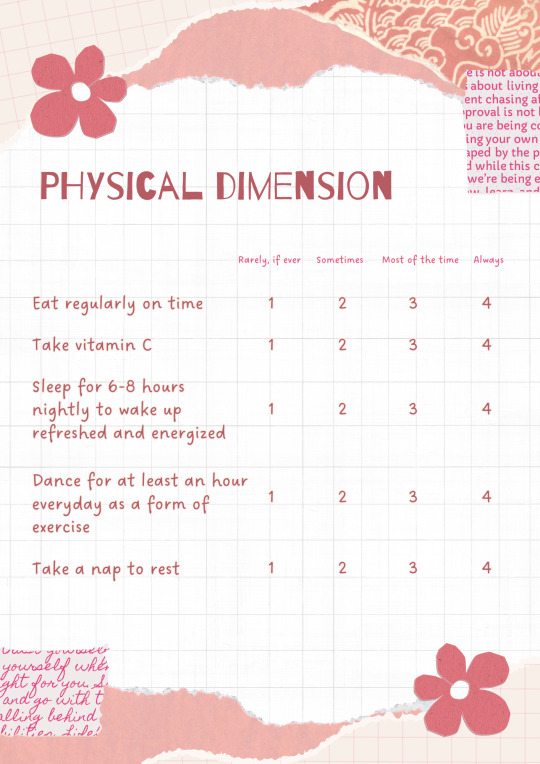
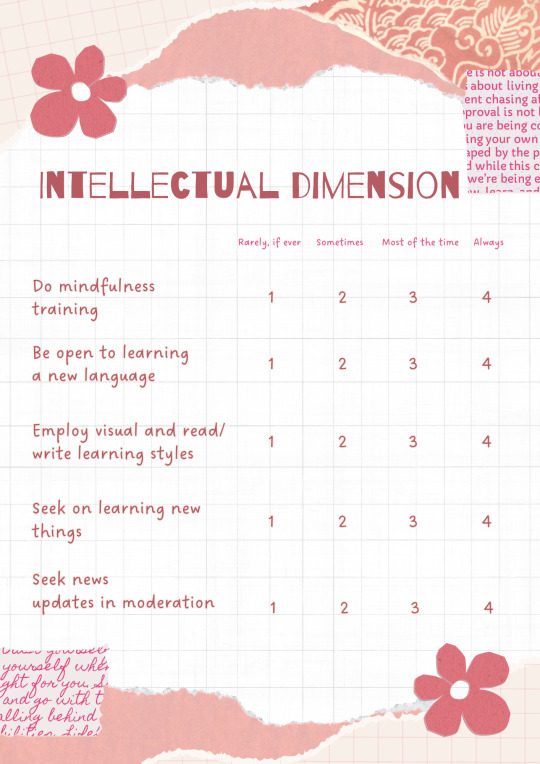
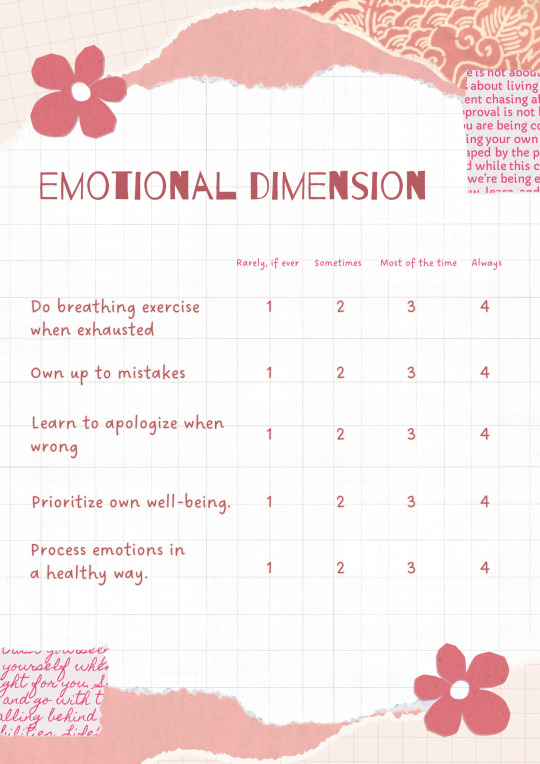
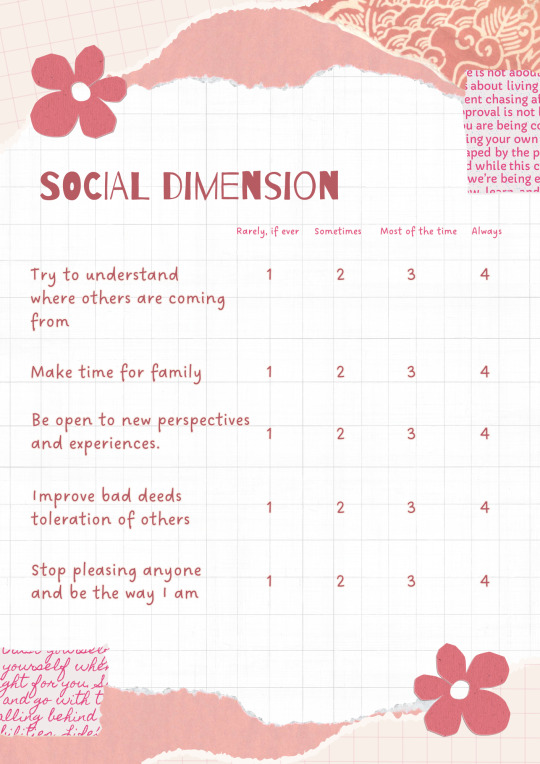
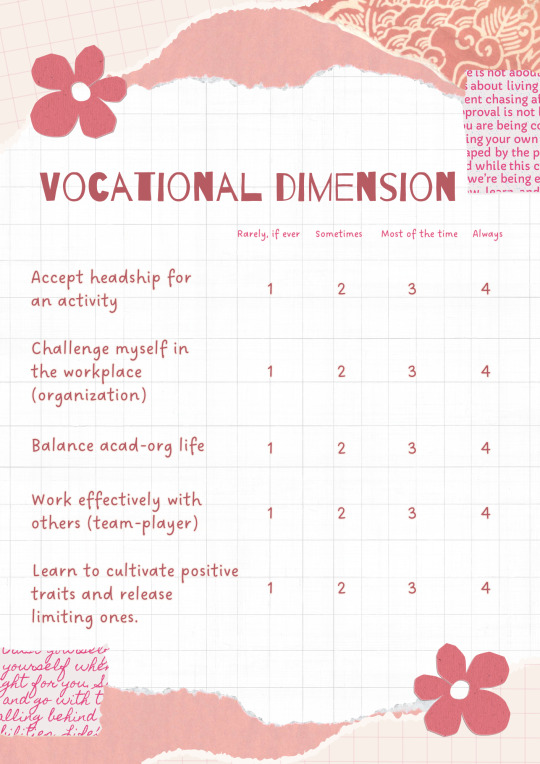
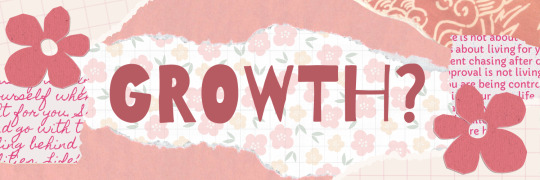
I drew my wellness dimension wheel in the belief that our existence is not a collection of separate compartments but rather a connection from, but not limited to, the strings of intellectual, physical, emotional, social, and vocational well-being. I have always believed that growth is not confined to outside achievements but happens BOTH internally and externally, heavily within ourselves and through our interactions with the environment. Thus, reflecting on my recent activities, academically and personally, I learned that my ultimate goal is to achieve inner and outer growth. I know this will lead to my positive development as a thriving person and help me reach lifelong goals. But why? You may ask.
I am an Applied Psychology (APsy) student, and as an APsy student, I constantly grapple with the stereotype of being "know-it-all" when it comes to the emotional and mental aspects of life! Yet, honestly, sometimes even understanding them does not make it easy to navigate our own. For a while, I struggled to find a connection through my personal goals (way too many, if I may add), a way to integrate them into a cohesive and exactly right representation. Then, I remember the quote by Rainer Maria Rilke I stumbled upon last year that resonated deeply: it says, "The ONLY journey is the journey WITHIN." At first, I thought of it as freedom in the mind and one's feelings, but then it struck me–the answer I had been looking for had been right in front of me all along! It is not a mere life sovereignty; it is about the continuous exploration of the depths within, a journey that focuses on self-growth, a holistic one! Hence, I chose the goal to focus on growth: growth in different aspects that I thought my chosen dimensions, interconnectedly, would cover self-awareness from social and emotional dimensions, self-esteem from emotional and physical dimensions, cognitive from physical and intellectual dimensions, analyzation form intellectual and vocational dimensions, and finally, leadership from social and vocational dimensions.
I believe that a well-rounded individual thrives when ALL dimensions, not only those I mentioned, are nurtured and perfectly interconnected. However, recognizing these connections from vocational, intellectual, physical, emotional, and social and actively fostering growth in each area of myself allows me to incorporate a richer conception of my well-being, enabling me to excel in various aspects of life. Overall, my wellness dimension wheel looks like this:
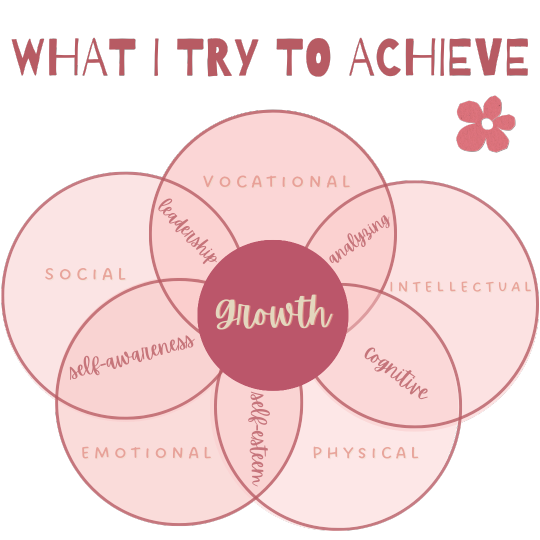
____________________________________
1 note
·
View note
Photo

Eyes On Me
Mouth may lie But this thing barely talks, This thing everybody thinks Takes your breath For when it smiles, You feel like facing a thousand deaths
Opalescent sky has clearly seen in this thing, The brightest among everything In the middle of chaos The orb-shaped ebony black eyes have been my shield
The sun above starts to set, I know it’s just you about to sleep How I miss The way you look at me When your whole dull world Was set on me
And it’s the time I want to close mine, too
0 notes
